The End of the Age

The coming of the lawless one is according to the working of Satan, |
with all power, signs, and lying wonders,
and with all unrighteous deception among those who perish,
because they did not receive the love of the truth,
that they might be saved.
And for this reason God will send them strong delusion,
that they should believe the lie, that they all may be condemned
who did not believe the truth but had pleasure in unrighteousness.
(II Thessalonians 2:9-12)



The Two Nimrods
As several Bible scholars have predicted, the world balance of power may now be shifting from the West to the East.
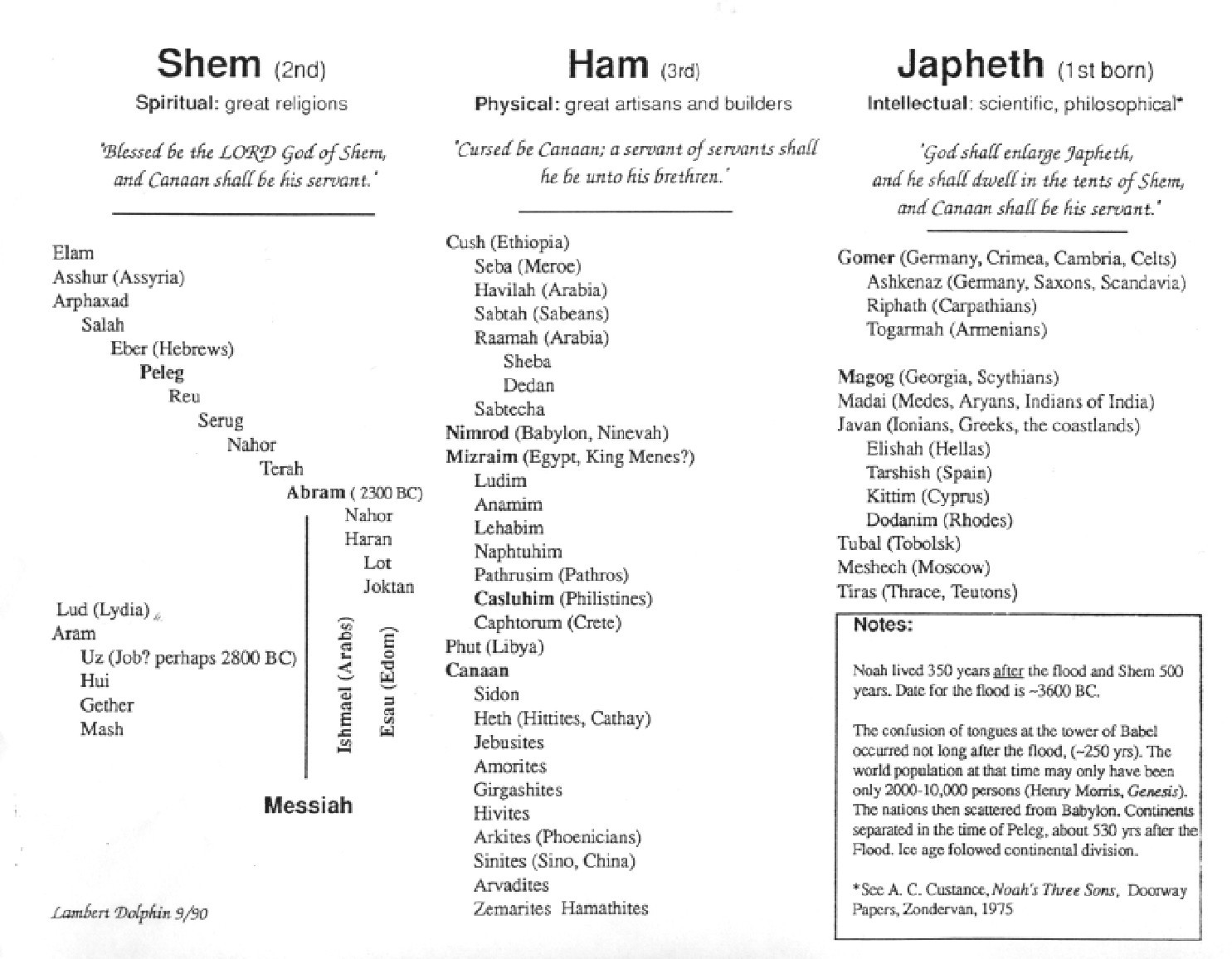
Ancient Babylon (modern Iraq) will rise to power again.
The Antichrist (Conjecture: Nimrod 2) may make his headquarters there in Babylon.
His cohort, the False Prophet will locate in Jerusalem.
Knowing the Bible well is the best way to understand this.


Nimrod I
Nimrod 1, was a historical figure, a mighty hunter in the earth. Probably he lived about 2787-2628 (BC). He was the great grandson of Noah. (Noah had three sons: Shem, Ham, and Japheth).
Four generations after the Flood of Noah, the total population of earth was probably about 100,000 persons, perhaps a million.
The sons of Ham were Cush, Mizraim, Put, and Canaan.
The sons of Cush were Seba, Havilah, Sabtah, Raamah, and Sabtechah; and the sons of Raamah were Sheba and Dedan.
Cush begot Nimrod; he began to be a mighty one on the earth.
He was a mighty hunter before the LORD; therefore it is said, “Like Nimrod the mighty hunter before the LORD.”
And the beginning of his kingdom was Babel, Erech, Accad, and Calneh, in the land of Shinar.
From that land he went to Assyria and built Nineveh, Rehoboth Ir, Calah,
and Resen between Nineveh and Calah (that is the principal city).
Mizraim begot Ludim, Anamim, Lehabim, Naphtuhim,
Pathrusim, and Casluhim (from whom came the Philistines and Caphtorim) (Genesis 10:6-14)
It seems likely that the breakup of the earth’s original one continent, Pangea, took place in the days of Peleg, Barry Setterfield's date for the Flood of Noah is 3536 BC.
The Garden of Eden was probably also in Iraq! It also seems reasonable that the consummation of history should center on Jerusalem in Israel and on Babylon in Iraq.
Not Rome, not Hong Kong, not Paris, London or Washington. Jerusalem is the world navel.
The total world population at the time Nimrod built the Tower of Babel was probably about 100,000 persons, as noted. This was only four generations after the Flood.
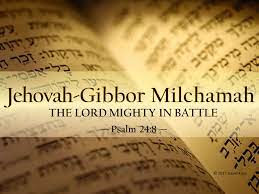
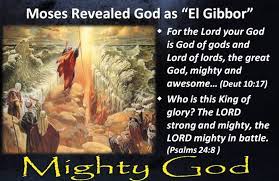 The Hebrew word gibbor, meaning “strong, mighty,” describes heroes like Nimrod, “a mighty warrior … a mighty hunter before the LORD” (Genesis 10:8-9), and later applied to the “mighty warriors” of King David of Israel (2 Samuel 23:8). It's a word depicting bravery, courage, and action.
The Hebrew word gibbor, meaning “strong, mighty,” describes heroes like Nimrod, “a mighty warrior … a mighty hunter before the LORD” (Genesis 10:8-9), and later applied to the “mighty warriors” of King David of Israel (2 Samuel 23:8). It's a word depicting bravery, courage, and action.
Nimrod worked in cahoots with his wife Semiramis who was his expert in religion. It is probably from the ancient Mystery Religion of Babylon that the many religions of the world sprang. Earth's original one language was broken into many tongues by Yahweh in the Tower of Babel affair.
Nimrod 2 will be a powerful powerful political and economic nation. He will have to pull the 200 nations of the world together into total submission to himself and to Satan the powerful source. The Antichrist is labeled “the Beast” (thērion) in Revelation 13. His #2 guy, the False Prophet can not be the Pope and is most likely a charismatic Jew. The false prophet, headquartered in Jerusalem will come into power backed by the Beast who will arrange a peace treaty protecting Israel from her enemies, this peace treaty will hold for three and a half years but then be broken. It is assumed here that Nimrod 2 he will be THE Antichrist of the book of Revelation.

The First Beast
of Revelation
Political Military Leader of the End of this Age
And I saw a beast rising out of the sea, having ten horns and seven heads; and on its horns were ten diadems, and on its heads were blasphemous names. And the beast that I saw was like a leopard, its feet were like a bear’s, and its mouth was like a lion’s mouth. And the dragon gave it his power and his throne and great authority. One of its heads seemed to have received a death-blow, but its mortal wound had been healed. In amazement the whole earth followed the beast. They worshipped the dragon, for he had given his authority to the beast, and they worshipped the beast, saying, ‘Who is like the beast, and who can fight against it?’
The beast was given a mouth uttering haughty and blasphemous words, and it was allowed to exercise authority for forty-two months. It opened its mouth to utter blasphemies against God, blaspheming his name and his dwelling, that is, those who dwell in heaven. Also, it was allowed to make war on the saints and to conquer them. It was given authority over every tribe and people and language and nation, and all the inhabitants of the earth will worship it, everyone whose name has not been written from the foundation of the world in the book of life of the Lamb that was slaughtered.
Let anyone who has an ear listen:
If you are to be taken captive,
into captivity you go;
if you kill with the sword,
with the sword you must be killed.
Here is a call for the endurance and faith of the saints.
The Second Beast
Head of the Coming One World Religion
Then I saw another beast that rose out of the earth; it had two horns like a lamb and it spoke like a dragon. It exercises all the authority of the first beast on its behalf, and it makes the earth and its inhabitants worship the first beast, whose mortal wound had been healed. It performs great signs, even making fire come down from heaven to earth in the sight of all; and by the signs that it is allowed to perform on behalf of the beast, it deceives the inhabitants of earth, telling them to make an image for the beast that had been wounded by the sword and yet lived; and it was allowed to give breath to the image of the beast, so that the image of the beast could even speak and cause those who would not worship the image of the beast to be killed. Also it causes all, both small and great, both rich and poor, both free and slave, to be marked on the right hand or the forehead, so that no one can buy or sell who does not have the mark, that is, the name of the beast or the number of its name.
This calls for wisdom: let anyone with understanding calculate the number of the beast, for it is the number of a person. Its number is six hundred and sixty-six. (Revelation 13)
|
The Antichrist, always seen in league with the fake messiah, will probably be headquartered in Europe until the Rapture.
There is a probably gap between the rapture and the start of the 70th week of Daniel. Andy Woods noted that Clarence Larkin and other old timers thought the gap might be as much as a hundred years. With the true church gone the new world religion must be monotheistic insisting that there can only be one true God but the false prophet is his sole representative on earth. #2 will insist that #1 is the long awaited savior of the world. He may well conscript words from Jesus such as “I am the way, and the truth, and the life, no man comes to the father except by me.” (I tentatively have suggested a gap of 12 years from the Rapture to the start of the 70th week of Daniel).
The Prophecy of Seventy Weeks is the narrative in chapter 9 of the Book of Daniel in which Daniel prays to God to act on behalf of his people and city (Judeans and Jerusalem), and, in response, is given a detailed but cryptic prophecy of "seventy weeks" by the angel Gabriel.
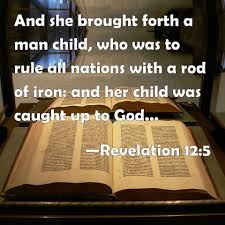 With the false prophet charismatically drawing all religiously inclined persons to the Third Temple in Jerusalem (as the gateway to heaven), the Antichrist will establish political power over all nations--succeeding where both the League of Nations and the UN failed--he will deal with money, banking, commerce and trade. Though there is a ten nation global community emerging out of the revived Roman Empire, the prevailing values will be Western.
With the false prophet charismatically drawing all religiously inclined persons to the Third Temple in Jerusalem (as the gateway to heaven), the Antichrist will establish political power over all nations--succeeding where both the League of Nations and the UN failed--he will deal with money, banking, commerce and trade. Though there is a ten nation global community emerging out of the revived Roman Empire, the prevailing values will be Western.
An optimum place for a new headquarters controlling commerce and trade. Rebuilt Babylon, rising Assyria, is the ideal hub, or gateway city uniting East and West. While the false prophet in Jerusalem is Jewish (with genealogy), Nimrod 2 may well be descended of Ham. His religious roots may not be in western culture but in the East. It has been suggested that he could be a Muslim. I think this is unlikely. Islam is seriously divided between Sunni and Shiite and will probably self-destruct in the Gog/Magog war soon after the Rapture.
Revelation 17 is about the purging of all false religions from the world in anticipation of the Second Advent of Jesus.
Revelation 18 is about transitioning from the present chaos of money management, banking and cabals to the kingdom rule required of Jesus from His headquarters in Jerusalem.
These conjectures are documented in our Working Papers on Babylon.

Second Thessalonians
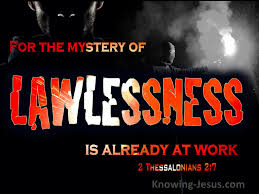
Paul, Silvanus, and Timothy,
To the church of the Thessalonians in God our Father and the Lord Jesus Christ:
2 Grace to you and peace from God our Father and the Lord Jesus Christ.
3 We must always give thanks to God for you, brothers and sisters, as is right, because your faith is growing abundantly, and the love of every one of you for one another is increasing. 4 Therefore we ourselves boast of you among the churches of God for your steadfastness and faith during all your persecutions and the afflictions that you are enduring.
The Judgement at Christ’s Coming
5 This is evidence of the righteous judgement of God, and is intended to make you worthy of the kingdom of God, for which you are also suffering. For it is indeed just of God to repay with affliction those who afflict you, 7 and to give relief to the afflicted as well as to us, when the Lord Jesus is revealed from heaven with his mighty angels 8 in flaming fire, inflicting vengeance on those who do not know God and on those who do not obey the gospel of our Lord Jesus. 9 These will suffer the punishment of eternal destruction, separated from the presence of the Lord and from the glory of his might, when he comes to be glorified by his saints and to be marveled at on that day among all who have believed, because our testimony to you was believed. 11 To this end we always pray for you, asking that our God will make you worthy of his call and will fulfil by his power every good resolve and work of faith, 12 so that the name of our Lord Jesus may be glorified in you, and you in him, according to the grace of our God and the Lord Jesus Christ.
The Man of Lawlessness
Chapter 2: As to the coming of our Lord Jesus Christ and our being gathered together to him, we beg you, brothers and sisters, 2 not to be quickly shaken in mind or alarmed, either by spirit or by word or by letter, as though from us, to the effect that the day of the Lord is already here. 3 Let no one deceive you in any way; for that day will not come unless the rebellion comes first and the lawless one is revealed, the one destined for destruction. 4 He opposes and exalts himself above every so-called god or object of worship, so that he takes his seat in the temple of God, declaring himself to be God. 5 Do you not remember that I told you these things when I was still with you? 6 And you know what is now restraining him, so that he may be revealed when his time comes. 7 For the mystery of lawlessness is already at work, but only until the one who now restrains it is removed. 8 And then the lawless one will be revealed, whom the Lord Jesus will destroy with the breath of his mouth, annihilating him by the manifestation of his coming. 9 The coming of the lawless one is apparent in the working of Satan, who uses all power, signs, lying wonders, 10 and every kind of wicked deception for those who are perishing, because they refused to love the truth and so be saved. 11 For this reason God sends them a powerful delusion, leading them to believe what is false, 12 so that all who have not believed the truth but took pleasure in unrighteousness will be condemned.
13 But we must always give thanks to God for you, brothers and sisters beloved by the Lord, because God chose you as the first fruits for salvation through sanctification by the Spirit and through belief in the truth. 14 For this purpose he called you through our proclamation of the good news, so that you may obtain the glory of our Lord Jesus Christ. 15 So then, brothers and sisters, stand firm and hold fast to the traditions that you were taught by us, either by word of mouth or by our letter.
16 Now may our Lord Jesus Christ himself and God our Father, who loved us and through grace gave us eternal comfort and good hope, 17 comfort your hearts and strengthen them in every good work and word. (2 Thessalonians 1-2) |
From Ray Stedman:
"Thus says the LORD: I will return to Zion, and will dwell in the midst of Jerusalem, and Jerusalem shall be called the faithful city, and the mountain of the LORD of hosts, the holy mountain." (Zechariah 8:3 RSV)
Here is a picture of God dwelling in the midst of his people. One day this is going to be fulfilled on the earth. In the land of Israel, what has been predicted is taking place, one startling event after another. The return of Jerusalem to Jewish control has prepared the way for the rebuilding of the temple on its old site. Scripture has long predicted that this would be one of the opening signs that God was about to move again to restore Israel at last to its place among the nations.
So we can read this section with great interest because it pictures something that is historically coming to pass, but we can read it with even greater interest because of what is spiritually symbolized in our own lives -- God in the midst of us. What will the result be? God dwelling in us, renewing the inner man, a fountain of blessing pouring out in our lives, making us fruitful and effective and a blessing to all with whom we come in contact. That is the picture of these last scenes.
Chapters 7 and 8 link together in a plea of God to the people to be honest and open before him. It is again a rehearsal of their failures in his sight and then a reminder that while he is unfailing in his mercy and grace, he is unchanging in his standards. He always supplies what is necessary but he never lowers the standards. The people react as people often do, in these three ways; first (chapter 7, verse 11):
But they refused to hearken, and turned a stubborn shoulder, and stopped their ears that they might not hear. (Zechariah 7:11 RSV)
That is always the first step. They pretend not to hear. And then (verse 12):
They made their hearts like adamant led they should hear the law and the words which the LORD of hosts had sent by his Spirit through the former prophets. (Zechariah 7:12a RSV)
They deliberately disobeyed, and then finally, they began to play the hypocrite. The chapter opens with a question of the people, "Shall we keep on with these feasts that we began in Babylon?" And God's word to them is, "Why are you doing it? Are you celebrating these feasts because you mean to worship, or simply for a religious show?"
These are some of the very ways that we avoid the will of God today. I remember years ago, one of my daughters was told by her mother to put on a green dress. It was interesting to watch her. She pretended at first not to hear. Then after her mother repeated the request several times, she openly rebelled and just said, "No. I don't want to wear that dress." And then, when it looked as though she would have to wear it, she came up to her mother and said, "Mother, I want to wear the green dress, but it is just too dirty," which was not true at all. In other words, she followed exactly the program that is outlined here. She pretended not to hear, she directly disobeyed, and then she played the hypocrite, and pretended that it was right and proper that she should disobey in this way. How accurately this catches up the inherent deceitful tendencies of the human heart!
But now God goes on to point out that the result will be a blindness to truth; that ultimately, they will lose the ability to see and hear. This is set forth for us in chapters 9 and 10 -- the picture of the blindness of the people, and right in the midst of this, you have the first of several amazingly accurate glimpses of the coming of the Messiah (chapter 9, verse 9):
Rejoice greatly, O daughter of Zion!
Shout aloud, O daughter of Jerusalem!
Lo, your king comes to you;
triumphant and victorious is he,
humble and riding on an ass,
on a colt the foal of an ass. (Zechariah 9:9 RSV)
And you recall how those words were literally fulfilled in the New Testament when our Lord sent his disciples to find a colt and an ass and he mounted the ass and rode in triumph in the streets of Jerusalem with the people going before and shouting "Hosanna to the Son of David! Blessed is he who comes in the name of the Lord!" (Matthew. 21:9) Exactly and unconsciously fulfilling this prophecy of Zechariah, "Lo, your king comes to you; triumphant and victorious," and you will know him because he is riding on an ass accompanied with a colt.
And yet, they did not know him and they did not recognize him when he came even in such a remarkable way. And as he drew near to Jerusalem, he wept as he looked out over the impenitent city and he said these remarkable words, "Would that even today you knew the things that make for peace. But now they are hid from your eyes." (Luke 19:42) That is what happens when God moves in your life and you do not listen; you lose the ability to hear, and these things are hid from your eyes. And the judgment of blindness came upon these people.
In chapter 11, after many rebuffs, the Messiah, again speaking through the prophet, says these amazing words (verse 12):
Then I said to them, "If it seems right to you, give me my wages; but if not, keep them." And they weighed out as my wages thirty shekels of silver. (Zechariah 11:12 RSV)
How much did Judas contract for in betraying our Lord? Thirty shekels of silver. According to the law if a slave was gored by an ox, the man who owned the ox could settle the whole matter by paying his neighbor thirty shekels of silver. Here the Messiah says to these people, "All right now, look if you want me, say so, but if you do not, give me my wages. What do you think I am worth to you?" And they weighed out for his price thirty shekels of silver.
Then comes the second result of an unrepentant heart and life (chapter 11, verses 15-17):
Then the LORD said to me, "Take once more the implement of a worthless shepherd. For lo, I am raising up in the land a shepherd who does not care for the perishing, or seek the wandering, or heal the maimed, or nourish the sound, but devours the flesh of the fat ones, tearing off even their hoofs.
Woe to my worthless shepherd,
who deserts the flock!
May the sword smite his arm
and his right eye!
Let his arm be wholly withered,
his right eye utterly blinded!" (Zechariah 11:15-17 RSV)
In other words, if you refuse the true shepherd, God will allow you to have a false shepherd. Again it was the Lord Jesus who said to the Pharisees, the blinded Pharisees of his day, "I have come in my Father's name, and you do not receive me; if another comes in his own name, him you will receive." (John 5:43) This is that character whom Paul tells us about in Thessalonians called the man of lawlessness who comes to Israel as their deliverer and is received as the Messiah, but turns out to be the anti-Messiah, what we know as the anti-Christ, the false shepherd who comes when they reject and refuse the truth. (2 Thessalonians 2:3 ff)
I have often wondered at the number of people who fall into anti-Christian cults that abound today. Why is it? Time after time I have found that they have done so because they have rejected some opportunity to hear the truth, and the result is that they fall into the clutches of what sounds like truth but is a lie. As Paul says, "God sends upon them a strong delusion to make them believe what is false...who did not believe the truth." (2 Thessalonians 2:11)
Then we come to the last section, chapters 12 through 14, where we have this beautiful picture of God finding a way to come back into the lives of his people. It opens with these words (chapter 12, verses 2, 3):
"Lo, I am about to make Jerusalem a cop of reeling to all the peoples round about; It will be against Judah also in the siege against Jerusalem. On that day I will make Jerusalem a heavy stone for all the peoples; all who lift it shall grievously hurt themselves. And all the nations of the earth will come together against it." (Zechariah 12:2-3 RSV)
According to the Scriptures, the darkest days for Jerusalem lie yet ahead. It shall become a burden to the nations, a grievous stone of stumbling, the prophetic scriptures say. The peoples of the nations shall be gathered together about the city and Zechariah tells us that God will not allow himself to be ignored. He vows that he will break through into human consciousness and it will come about this way (verses 9, 10):
"And on that day I will seek to destroy all the nations that come against Jerusalem. And I will pour out on the house of David and the inhabitants of Jerusalem a spirit of compassion and supplication, so that, when they look on him whom they have pierced, they shall mourn for him, as one mourns for an only child, and weep bitterly over him, as one weeps over a firstborn." (Zech12:9-10 RSV)
Isn't that amazing? Israel in its blindness refusing its Messiah refusing to recognize the one that God sent, never realizing that the one whom they pierced is coming again And when he comes. he will speak these words (chapter 13 verse 6):
"And if one asks him, 'What are these wounds on your back?'" [or, as other versions say, "in your hands"] "He will say, 'The wounds I received in the house of my friends.'"
This ties in with the vivid, descriptive sequence in chapter 14 (verses 1-4):
Behold, a day of the LORD is coming, when the spoil taken from you will be divided in the midst of you. For I will gather all the nations against Jerusalem to battle, and the city shall be taken and the houses plundered and the women ravished; half of the city shall go into exile, but the rest of the people shall not be cut off from the city. Then the LORD will go forth and fight against those nations as when he fights on a day of battle. On that day his feet shall stand on the Mount of Olives... (Zechariah 14:1-4a RSV)
You remember that was the place that Jesus stood on this earth He went out with his disciples on the Mount of Olives and as they watched him he was taken up out of their sight into the heavens and an angel standing there said to them, This Jesus who was taken up from you into heaven, will come in the same way as you saw him go into heaven " (Acts 1:11 ).
On that day his feet shall stand on the Mount of Olives which lies before Jerusalem on the east; and the Mount of Olives shall be split in two from east to west by a very wide valley; so that one half of the Mount shall withdraw northward, and the other half southward. And the valley of my mountains shall be stopped up, for the valley of the mountains shall touch the sides of it; and you shall flee as you fled from the earthquake in the days of Uzziah king of Judah. (Zechariah 14:4-5a RSV)
Geologists have long known that one of the greatest faults in the earth's surface runs right through the Mount of Olives. The mountain shall be split in half, and then what? Well, when Israel has seen its Messiah and mourned for the one whom it pierced and has recognized with great mourning that it had turned its back upon the one sent of God, then we read (chapter 14, verses 8,9):
On that day living waters shall flow out from Jerusalem, half of them to the eastern sea and half of them to the western sea; it shall continue in summer as in winter. And the LORD will become king over all the earth; on that day the LORD will be one and his name one. (Zechariah 14:8-9 RSV)
This is picturing the glory of the earth in the days when God shall reign through his Son as king.
The book closes then with these beautiful words (verse 20, 21):
And on that day there shall be inscribed on the bells of the horses, "Holy to the LORD." And the pots in the house of the LORD shall be as the bowls before the altar; and every pot in Jerusalem and Judah shall be sacred to the LORD of hosts, so that all who sacrifice may come and take of them and boil the flesh of the sacrifice in them. And there shall no longer be a trader in the house of the LORD of hosts on that day. (Zechariah 14:20-21 RSV)
Every commonplace thing is made to be holy unto the Lord. Do you know that that is what God is promising to you? Every moment of your life, every commonplace thing is touched with the glory of his presence when he is in the center of your life. It will be visibly true on the earth someday. It can be spiritually true right now. ---Ray Stedman: I'll Return to You if you Return to Me.
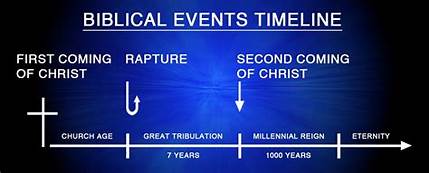
|


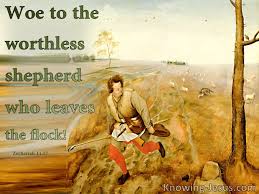
The Worthless Shepherd
In a previous article, Jesus the Shepherd-king, we discussed briefly the powerful and important role Jesus the Messiah has in the nation of Israel's past history and her future destiny. There are at least three dozen references to shepherds in the Old Testament--and a dozen and a half in the New Testament. As for sheep, one can find references to sheep nearly two hundred times in the Scriptures.
 Whether in the Old Testament of the New, Jesus the Messiah is the True Shepherd of the sheep, and the rightful King of Israel, and all the nations.
Whether in the Old Testament of the New, Jesus the Messiah is the True Shepherd of the sheep, and the rightful King of Israel, and all the nations.
Believers are like sheep, and Jesus is our own personal shepherd if we have entered into a personal relationship with Him. W. Phillip Keller's perennially favorite book A Shepherd Looks at the Twenty-Third Psalm, offers us city-folk help in understanding the nature and the ways of sheep ("all we like sheep have gone astray, we have turned everyone to his own way..."). Keller also speaks of the devoted, personal care a good shepherd displays in caring for the sheep of his fold. With Jesus, the shepherd's care of His own lasts forever, "...the Lamb who is in the midst of the throne will shepherd them and lead them to living fountains of waters. And God will wipe away every tear from their eyes." (Revelation 21:4-6).
Travelers in Israel even today will often see Bedouins herding their sheep and goats on the hills-the sheep and goats look alike, but the company of goats is advantageous to the sheep. Goats are more active, enterprising, resourceful, and they know how to take better care of themselves. Sheep are among the most helpless of animals, and they're not very bright.
In both the Old Testament, with regard to Israel, and in the church, God entrusts the care of his flock to under-shepherds who are supposed to report directly and constantly to the Chief Shepherd. Jeremiah has a lot to say against Israel's leaders who had in effect brought harm and not good to God's flock.
Jeremiah's words against Israel's kings and priests and leaders came as the captivity of the Jews to Babylon drew near. As one often sees in the writings of the prophets, long term, good news is promised for God's people, in spite of the approaching near-term disasters. In this case the impending destruction of Jerusalem by the Babylonians (586 BC) was on the immediate horizon:
"Woe to the shepherds who destroy and scatter the sheep of My pasture!" says the LORD. Therefore thus says the LORD God of Israel against the shepherds who feed My people: "You have scattered My flock, driven them away, and not attended to them. Behold, I will attend to you for the evil of your doings," says the LORD.
[Future] "But I will gather the remnant of My flock [believing Jews] out of all countries where I have driven them, and bring them back to their folds; and they shall be fruitful and increase. "I will set up shepherds over them who will feed them; and they shall fear no more, nor be dismayed, nor shall they be lacking," says the LORD.
"Behold, the days are coming," says the LORD, "That I will raise to David a Branch of righteousness; A King shall reign and prosper, And execute judgment and righteousness in the earth. In His days Judah will be saved, And Israel will dwell safely; Now this is His name by which He will be called:
THE LORD OUR RIGHTEOUSNESS. [Yahweh tsidkenu]
"Therefore, behold, the days are coming," says the LORD, "that they shall no longer say, 'As the LORD lives who brought up the children of Israel from the land of Egypt,' "but, 'As the LORD lives who brought up and led the descendants of the house of Israel from the north country and from all the countries where I had driven them.' And they shall dwell in their own land." (Jeremiah 23:1-8)
 Haggai, Zechariah and Malachi were God's prophets in Israel after the Jews returned from Babylon. As Isaiah had predicted two hundred years earlier, God would use the Persians, who conquered Babylon in 539 BC, to permit the Jews to return to Jerusalem from Babylon. The Jews did indeed rebuild their [Second] temple, dedicating it in 515 BC (with encouragement from Haggai), They served under Zerubbabel, a legitimate king in the line of David, and a legitimate High Priest, Joshua. In 445 BC Nehemiah came to rebuild the walls of Jerusalem. God's next major move in Israel's history would come nearly 500 years later when Israel's long awaited Messiah would make his appearance among His own people. Matthew, Mark, Luke and John all announced Messiah's arrival and His work.
Haggai, Zechariah and Malachi were God's prophets in Israel after the Jews returned from Babylon. As Isaiah had predicted two hundred years earlier, God would use the Persians, who conquered Babylon in 539 BC, to permit the Jews to return to Jerusalem from Babylon. The Jews did indeed rebuild their [Second] temple, dedicating it in 515 BC (with encouragement from Haggai), They served under Zerubbabel, a legitimate king in the line of David, and a legitimate High Priest, Joshua. In 445 BC Nehemiah came to rebuild the walls of Jerusalem. God's next major move in Israel's history would come nearly 500 years later when Israel's long awaited Messiah would make his appearance among His own people. Matthew, Mark, Luke and John all announced Messiah's arrival and His work.
Zechariah's writing looks to Israel's future. In visions and oracles he foresaw both the First and Second Advents of Messiah.
Like the other writers of the Old Testament, Zechariah did not see the 2000 year gap between these two advents of Israel's Shepherd-king. The approaching creation of what we call the church was not even announced in Scripture until near the end of Jesus' ministry when Jesus made these plans known, (Matthew 16:13-19). This was after His rejection by the people and the national leadership of Israel. Jesus' approaching betrayal, mock trial, and execution in Jerusalem was essentially a done deal. His resurrection and the subsequent strong testimonies of His disciples (as seen in the book of Acts) did not change pubic opinion in Israel, but only made things worse for the remnant.
Zechariah's' announcement that their true Shepherd-King would ride into Jerusalem on a donkey is quoted in Matthew 21:2-7 and John 12:12-15 in reference to what we now call Palm Sunday.
Rejoice greatly, O daughter of Zion! Shout aloud, O daughter of Jerusalem! Lo, your king comes to you; triumphant and victorious is he, humble and riding on an ass, on a colt the foal of an ass. (Zechariah 9:9)
There follows an announcement by Zechariah of Messiah's second advent, as if the second coming of Messiah would immediately follow the first. Messiah's anger against false shepherds and his long term plans for His people Israel are the subject of Zechariah Chapter 10:
"My anger is kindled against the shepherds, And I will punish the goatherds. For the LORD of hosts will visit His flock, The house of Judah, And will make them as His royal horse in the battle. From him comes the cornerstone, From him the tent peg, From him the battle bow, From him every ruler together. They shall be like mighty men, Who tread down their enemies In the mire of the streets in the battle. They shall fight because the LORD is with them, And the riders on horses shall be put to shame. "I will strengthen the house of Judah, And I will save the house of Joseph. I will bring them back, Because I have mercy on them. They shall be as though I had not cast them aside; For I am the LORD their God, And I will hear them. Those of Ephraim shall be like a mighty man, And their heart shall rejoice as if with wine. Yes, their children shall see it and be glad; Their heart shall rejoice in the LORD. I will whistle for them and gather them, For I will redeem them; And they shall increase as they once increased..." (Zechariah 10:3-8)
By the way, Zechariah's description of "shepherds" includes kings, priests, governors, overseers. It is not merely religious leaders who are in view when a shepherd of Israel, or a foreign shepherd, is described symbolically in the Old Testament.
In Chapter 11, the prophet was called to act out the role of Israel's various future shepherds. His first assignment was to play the role of Israel's shepherd over a flock "destined to slaughter." In the light of subsequent history we can now see that this is a reference to the consequences to Israel which would follow their rejection of Jesus, their True Shepherd. Though most of the nation had turned away in rejecting Jesus "the poor of the flock," (i.e., the faithful remnant), had not. This little flock would include the disciples, key members of the believing remnant.
Setting the nation Israel aside for a season, the Good Shepherd asked these disciples to go to the gentiles inviting any and all to come into His greater family-essentially another branch of the family of Abraham. (The parable of Jesus in Matthew 22:1-14 is vividly clear to us now by way of hindsight).
Messiah's first advent was a near-total failure with regard to the Jewish nation, because of Jesus' rejection by the people and their leadership-the Pharisees, Sadducees, Scribes, and their Roman overlords. ("He came to his own, but his own received him not...")
From then on Pilate sought to release Him, but the Jews cried out, saying, "If you let this Man go, you are not Caesar's friend. Whoever makes himself a king speaks against Caesar." When Pilate therefore heard that saying, he brought Jesus out and sat down in the judgment seat in a place that is called The Pavement, but in Hebrew, Gabbatha. Now it was the Preparation Day of the Passover, and about the sixth hour. And he said to the Jews, "Behold your King!" But they cried out, "Away with Him, away with Him! Crucify Him!" Pilate said to them, "Shall I crucify your King?"
The chief priests answered, "We have no king but Caesar!"
Then Pilate delivered Him to them to be crucified. So they took Jesus and led Him away." (John 19:12-16)
Jesus fully realized the terrible future ahead for His people Israel, during his final visit to Jerusalem.
Then, as He was now drawing near the descent of the Mount of Olives, the whole multitude of the disciples began to rejoice and praise God with a loud voice for all the mighty works they had seen, saying:" 'Blessed is the King who comes in the name of the LORD!' Peace in heaven and glory in the highest!" And some of the Pharisees called to Him from the crowd, "Teacher, rebuke Your disciples." But He answered and said to them, "I tell you that if these should keep silent, the stones would immediately cry out."
Now as He drew near, He saw the city and wept over it, saying, "If you had known, even you, especially in this your day, the things that make for your peace! But now they are hidden from your eyes. "For days will come upon you when your enemies will build an embankment around you, surround you and close you in on every side, "and level you, and your children within you, to the ground; and they will not leave in you one stone upon another, because you did not know the time of your visitation." (Luke 19:37-44)
Before moving into a discussion of Israel's coming false or worthless shepherd, Zechariah presents a prophetic overview of Messiah's rejection and the terrible consequences for His people.
Thus says the LORD my God, [to Zechariah] "Feed the flock for slaughter, whose owners slaughter them and feel no guilt; those who sell them say, 'Blessed be the LORD, for I am rich'; and their shepherds do not pity them. For I will no longer pity the inhabitants of the land," says the LORD. "But indeed I will give everyone into his neighbor's hand and into the hand of his king. They shall attack the land, and I will not deliver them from their hand." So I fed the flock for slaughter, in particular the poor of the flock. I took for myself two staffs: the one I called Beauty, and the other I called Bonds; and I fed the flock. (Zechariah11:4-7)
"I dismissed the three shepherds in one month. My soul loathed them, and their soul also abhorred me. [v 8 is difficult and controversial, probably the reference is to three classes of leaders such as prophets, priests and kings-- James Boice.]
Then I [Zechariah] said, "I will not feed you. Let what is dying die, and what is perishing perish. Let those that are left eat each other's flesh." And I took my staff, Beauty, and cut it in two, that I might break the covenant which I had made with all the peoples. So it was broken on that day. Thus the poor of the flock, who were watching me, knew that it was the word of the LORD. (11:8-11)
The unity and national identity of Israel would be broken, and God would remove His protection of Israel from hostile foreign nations. The "poor of the flock" [the believing remnant] would perceive the hand of God in all these coming events.
Assuming the role of Israel's true Messiah, Zechariah asks what wages he should be paid for his services. The sarcastic answer is that he was thought worth no more to them than the price of a slave, a mere 30 shekels. (The reference here is of course to the disciple Judas and his betrayal of Jesus for 30 pieces of silver).
Then I said to them, "If it is agreeable to you, give me my wages; and if not, refrain." So they weighed out for my wages thirty pieces of silver. And the LORD said to me, "Throw it to the potter"--that princely price they set on me. So I took the thirty pieces of silver and threw them into the house of the LORD for the potter. Then I cut in two my other staff, Bonds, that I might break the brotherhood between Judah and Israel. (11:12-14)
Jesus had predicted the destruction of the Second Jewish temple (Matthew 24:1-2). That took place in AD 70 when Titus besieged the city in order to quell ongoing riots against Roman rule. In AD 132 a man named Bar Kochba led a further revolt against Roman rule. At that time Rabbi Akiva declared Bar Kochba to be the Messiah. This resulted in more revolt and inevitably further persecution of the Jews by the Romans, culminating in AD 135. Josephus says the loss of life during these Jewish revolts was of the order of 1.5 million Jews. The Jews were finally dispersed altogether from their own land for nearly two millennia. (See Deuteronomy 29 which concerns the right of the Jews to live in their land).
For all practical purposes the nation Israel then disappeared from the stage of history, some thought forever. But Jews began to trickle back to their own land in the late 19th Century and in 1948, statehood was declared as British and French rule in the Middle East way gave way to national independence.
At the close of Chapter 11, Zechariah acts out the role of a coming worthless, or "foolish" shepherd of Israel. He will violently and cruelly mistreat the flock of Israel-especially the believing remnant whom he will hunt down and murder. But his strength and his discernment, (symbolized by the arm withering and the right eye going blind)-will fail him utterly when the True Shepherd returns.
And the LORD said to me, "Next, take for yourself the implements of a foolish shepherd. for indeed I will raise up a shepherd in the land who will not care for those who are cut off, nor seek the young, nor heal those that are broken, nor feed those that still stand. But he will eat the flesh of the fat and tear their hooves in pieces.
"Woe to the worthless shepherd, Who leaves the flock! A sword shall be against his arm And against his right eye; His arm shall completely wither, And his right eye shall be totally blinded." (Zechariah 11:15-17)
[The Hebrew word translated "foolish" (Heb.: 'eviliy) is used in a moral sense, as in Proverbs, and means one who despises wisdom, a person who mocks when guilty, who is quarrelsome, and licentious].
We can immediately connect other prophetic passages in the Old Testament and the New which speak of Israel's worthless shepherd. Jesus spoke of the fake Messiah who would come on stage in Israel because He, the rightful Shepherd, had already been rejected by His people.
"...the Father Himself, who sent Me, has testified of Me. You have neither heard His voice at any time, nor seen His form. But you do not have His word abiding in you, because whom He sent, Him you do not believe. You search the Scriptures, for in them you think you have eternal life; and these are they which testify of Me. But you are not willing to come to Me that you may have life. I do not receive honor from men. But I know you, that you do not have the love of God in you. I have come in My Father's name, and you [Jews] do not receive Me; if another comes in his own name, him you will receive. How can you believe, who receive honor from one another, and do not seek the honor that comes from the only God? Do not think that I shall accuse you to the Father; there is one who accuses you--Moses, in whom you trust. "For if you believed Moses, you would believe Me; for he wrote about Me. But if you do not believe his writings, how will you believe My words?" (John 5:37-47)
Israel's future foolish, or worthless, shepherd is synonymous with Paul's "man of sin" or "lawless one" in 2 Thessalonians:
"Now, brethren, concerning the coming of our Lord Jesus Christ and our gathering together to Him, we ask you, not to be soon shaken in mind or troubled, either by spirit or by word or by letter, as if from us, as though the day of Christ had come. Let no one deceive you by any means; for that Day will not come unless the falling away comes first, and the man of sin is revealed, the son of perdition, who opposes and exalts himself above all that is called God or that is worshiped, so that he sits as God in the temple of God, showing himself that he is God. Do you not remember that when I was still with you I told you these things? And now you know what is restraining, that he may be revealed in his own time. For the mystery of lawlessness is already at work; only He who now restrains will do so until He is taken out of the way.
And then the lawless one will be revealed, whom the Lord will consume with the breath of His mouth and destroy with the brightness of His coming. The coming of the lawless one is according to the working of Satan, with all power, signs, and lying wonders, and with all unrighteous deception among those who perish, because they did not receive the love of the truth, that they might be saved. And for this reason God will send them strong delusion, that they should believe the lie, that they all may be condemned who did not believe the truth but had pleasure in unrighteousness. But we are bound to give thanks to God always for you, brethren beloved by the Lord, because God from the beginning chose you for salvation through sanctification by the Spirit and belief in the truth, to which He called you by our gospel, for the obtaining of the glory of our Lord Jesus Christ. Therefore, brethren, stand fast and hold the traditions which you were taught, whether by word or our epistle. (2 Thessalonians 2:1-15)
Looking back at the predictions of our Lord Jesus in the Olivet Discourse, Paul's "man of sin" is also the personage Jesus called "the abomination of desolation," calling attention to relevant prophecies by Daniel.
"Therefore when you [believing Jews living in Jerusalem] see the 'abomination of desolation,' spoken of by Daniel the prophet, standing in the holy place [the temple]" (whoever reads, let him understand), "then let those who are in Judea flee to the mountains. Let him who is on the housetop not go down to take anything out of his house. And let him who is in the field not go back to get his clothes. But woe to those who are pregnant and to those who are nursing babies in those days! And pray that your flight may not be in winter or on the Sabbath. For then there will be great tribulation, such as has not been since the beginning of the world until this time, no, nor ever shall be. And unless those days were shortened, no flesh would be saved; but for the elect's sake those days will be shortened." (Matthew 24-15-22)
One also finds this false shepherd announced as the second of two "beasts" (evil, human world rulers) announced in the book of the Revelation:
"Then I saw another beast coming up out of the earth, and he had two horns like a lamb and spoke like a dragon. And he exercises all the authority of the first beast in his presence, and causes the earth and those who dwell in it to worship the first beast, whose deadly wound was healed." (Revelation 13:11-12)
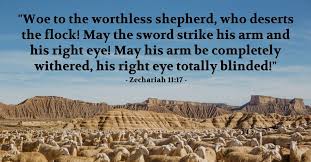 Ray Stedman comments as follows on this passage: "This beast arises from the earth, used throughout the book as a symbol of Israel. That is why most biblical scholars say this man is probably a Jew. He comes from Israel and has "two horns like a lamb, but he talks like a dragon." He looks like a lamb, but he talks like a dragon. He is, therefore, a fake lamb, to put it bluntly. This is the Antichrist, the one who comes instead of Christ, who offers himself as though he were Christ. It is for this reason I believe the term Antichrist is properly applied to this second beast, although both beasts are anti-Christian in character. Horns speak of power, and this man has two lamb-like powers. Jesus also had these powers: the powers of a priest and of a prophet. This man acts as both. Jesus is a priest who leads men and women all over the world to worship the Father; and this individual is a priest, leading the world to worship the first beast.
Ray Stedman comments as follows on this passage: "This beast arises from the earth, used throughout the book as a symbol of Israel. That is why most biblical scholars say this man is probably a Jew. He comes from Israel and has "two horns like a lamb, but he talks like a dragon." He looks like a lamb, but he talks like a dragon. He is, therefore, a fake lamb, to put it bluntly. This is the Antichrist, the one who comes instead of Christ, who offers himself as though he were Christ. It is for this reason I believe the term Antichrist is properly applied to this second beast, although both beasts are anti-Christian in character. Horns speak of power, and this man has two lamb-like powers. Jesus also had these powers: the powers of a priest and of a prophet. This man acts as both. Jesus is a priest who leads men and women all over the world to worship the Father; and this individual is a priest, leading the world to worship the first beast.
"Many have pointed out that we have here a kind of Satanic trinity -- the first beast corresponding to the Father, the false prophet corresponding to the Son, and the dragon himself, Satan, playing the role of the invisible Holy Spirit. It is Satan's imitation of the true God. The false priest accomplishes his aim in getting the world to worship the beast in a very remarkable way, described in 13 through 15.
He performed great and miraculous signs, even causing fire to come down from heaven to earth in full view of men. Because of the signs he was given power to do on behalf of the first beast, he deceived the inhabitants of the earth [those who dwell on the earth]. He ordered them to set up an image in honor of the beast who was wounded by the sword and yet lived. He was given power to give breath to the image of the first beast, so that it could speak and cause all who refused to worship the image to be killed. (Revelation 13:13-15 NIV)
"Here he acts as a prophet. The prophets of old did miracles to establish their credentials, their God-given authority. Moses and Elijah each did great miracles, and, as the two witnesses of Chapter 11, they call fire down from heaven. So this man must call fire from heaven. Paul tells us that the devil has the power to do miracles too. Thus we must not trust every miracle as though it were done by God. It may be the work of the enemy, the Evil One. This false prophet calls down fire out of heaven, and deceives the world by such means.
"Many biblical scholars feel that, because he is a Jew, he has his headquarters in Jerusalem. I think that is highly likely. He is the one whom the prophet Daniel identifies as making a covenant with the Jews for one week (7 years), and thus solving the centuries-old problem of the Middle East, the enmity between the Arabs and Israelis. During the first half of that week, the temple will be rebuilt on Mount Moriah...For a seven-year period the Jews believe they are allowed to re-establish their worship in the temple. But, Daniel says, this "prince who will come" (Daniel 9:26 KJV) shall break that covenant in the middle of the week, i.e. after three and a half years, and entering the temple himself, begin to exalt himself as God, as Paul describes in his letter to the Thessalonians.
"Since the political leader of the western coalition is in Rome, this religious leader in Jerusalem seems to feel it necessary to create an image of the Roman leader and put it in the temple for the worship of the world. He is able, we are told, to give breath to that image to make it seem alive. In one of the exhibits in Disneyland you can find Abraham Lincoln sitting in a chair! He looks very real and while you are standing there he will get up out of the chair and walk over and talk to you! I shall never forget how impressive it was to see and hear Abraham Lincoln when I visited that exhibit! The technology to make an image of a man that seems to live and speak and walk, is already here. The whole world will doubtless run tour buses to worship it. It is not necessary that they really think it is a living person, but they will worship it because it represents a living person, and they will honor that impressive symbol in that day. By means of that image this false prophet will claim godlike powers for himself and the first beast, and will command the loyalty and obedience of all on the earth. In Verse 16 we learn this man also rebuilds the world's economic system.
He also forced everyone, small and great, rich and poor, free and slave, to receive a mark on his right hand or on his forehead, so that no one could buy or sell unless he had the mark, which is the name of the beast or the number of his name. This calls for wisdom. If anyone has insight, let him calculate the number of the beast, for it is man's number. His number is 666. (Revelation 13:16-18 NIV)
"Evidently during these days worldwide commerce will be rigidly controlled from a central headquarters. Again we know that the technology to do this is already in place. If you have a credit card you know that your entire credit information can be imprinted on that little metallic strip on the back so that whenever you present that card everyone will instantly know whether you are a cheapskate or that you pay your bills. You cannot hide. Furthermore, we are told that it can all be actually implanted in a tiny disk in the skin on the back of the hand or on the forehead or wherever desired, so that information about you can be read by passing your hand under a beam of light just as they do now in the supermarkets with the bar codes. The technology is already available. It is remarkable how we are apparently drawing close to these days...
"So we see that John is showing us how the devil works. He attempts to organize behavior and from that always comes violence. When any government turns totalitarian and seeks to control every deed, every act, of its citizens, it produces a violent reaction. Turn on your television sets and you will see it in every news broadcast today. The Antichrist tries to organize belief as well as behavior, and when belief is organized it always produces deceit. There is nothing more deceitful than false religion. These are the weapons of Satan: He either intimidates or deceives. He has only two weapons, force and fantasy, lying and brutality, one or the other, or a mixture of both.
"What this text is saying is that when he is violent, then wait, endure, be patient! God will work this all out. His rules will never be set aside. Sooner or later Satan's instrument will hang himself, as Judas did; he will be caught up in his own web. And when he lies, "Think," God says, "be critical, evaluate!" When anyone acts godlike, makes pretentious claims, claims supernatural gifts and demands obedience, that is not God talking. He is not from God. It is just a man, that is all, thinking and acting like a fallen man. It is not the real Lamb -- it is only a fake lamb, so laugh at him and refuse to follow him. But be prepared to hold out even unto death! That is the message of this chapter. I hope you can see how true this is, how it is confirmed by life around us every day. We are headed for these very things at a greater speed then we have ever seen before in the history of the world." --Ray Stedman, When Men Become Beasts.
The false shepherd of Israel is most likely the "king," or ruler in Jerusalem, at the time of the last great world war. See Nearing the End of the Age.
"Then the king [the foolish shepherd, ruling in Jerusalem] shall do according to his own will: he shall exalt and magnify himself above every god, shall speak blasphemies against the God of gods, and shall prosper till the wrath has been accomplished; for what has been determined shall be done. "He shall regard neither the God of his fathers nor the desire of women, nor regard any god; for he shall exalt himself above them all. "But in their place he shall honor a god of fortresses [forces]; and a god which his fathers did not know he shall honor with gold and silver, with precious stones and pleasant things. "Thus he shall act against the strongest fortresses with [the help of] a foreign god, [evidently the first beast of Revelation 13] which he shall acknowledge, and advance its glory; and he shall cause them to rule over many, and divide the land [Israel] for gain." (Daniel 11:36-39)
The end of Israel's worthless shepherd will come about suddenly when Jesus the True Shepherd King makes His second appearance on earth, this time appearing in full military power and might. Here the book of Revelation closely parallels the final three chapters of Zechariah, 12-14.
"Now I saw heaven opened, and behold, a white horse. And He who sat on him was called Faithful and True, and in righteousness He judges and makes war. His eyes were like a flame of fire, and on His head were many crowns. He had a name written that no one knew except Himself. He was clothed with a robe dipped in blood, and His name is called The Word of God. And the armies in heaven, clothed in fine linen, white and clean, followed Him on white horses. Now out of His mouth goes a sharp sword, that with it He should strike the nations. And He Himself will rule them with a rod of iron. He Himself treads the winepress of the fierceness and wrath of Almighty God. And He has on His robe and on His thigh a name written: KING OF KINGS AND LORD OF LORDS. Then I saw an angel standing in the sun; and he cried with a loud voice, saying to all the birds that fly in the midst of heaven, "Come and gather together for the supper of the great God, "that you may eat the flesh of kings, the flesh of captains, the flesh of mighty men, the flesh of horses and of those who sit on them, and the flesh of all people, free and slave, both small and great." And I saw the beast, the kings of the earth, and their armies, gathered together to make war against Him who sat on the horse and against His army. Then the beast was captured, and with him the false prophet who worked signs in his presence, by which he deceived those who received the mark of the beast and those who worshiped his image. These two were cast alive into the lake of fire burning with brimstone." (Revelation 19:11-20)
The approaching arrival of Israel's false prophet on the stage of history affects not only that nation, but the entire world. Ray Stedman offers this caution and encouragement,
"In other words, if you refuse the true shepherd, God will allow you to have a false shepherd. Again it was the Lord Jesus who said to the Pharisees, the blinded Pharisees of his day, "I have come in my Father's name, and you do not receive me; if another comes in his own name, him you will receive." (John 5:43) This is that character whom Paul tells us about in Thessalonians called the man of lawlessness who comes to Israel as their deliverer and is received as the Messiah, but turns out to be the anti-Messiah, what we know as the anti-Christ, the false shepherd who comes when they reject and refuse the truth. (2 Thessalonians 2:3ff)
"I have often wondered at the number of people who fall into anti-Christian cults that abound today. Why is it? Time after time I have found that they have done so because they have rejected some opportunity to hear the truth, and the result is that they fall into the clutches of what sounds like truth but is a lie. As Paul says, "God sends upon them a strong delusion to make them believe what is false...who did not believe the truth." (2 Thessalonians 2:11)
"Then we come to the last section, chapters 12 through 14, where we have this beautiful picture of God finding a way to come back into the lives of his people. It opens with these words (chapter 12, verses 2, 3):
"Lo, I am about to make Jerusalem a cop of reeling to all the peoples round about; It will be against Judah also in the siege against Jerusalem. On that day I will make Jerusalem a heavy stone for all the peoples; all who lift it shall grievously hurt themselves. And all the nations of the earth will come together against it." (Zechariah 12:2-3 RSV)
"According to the Scriptures, the darkest days for Jerusalem lie yet ahead. It shall become a burden to the nations, a grievous stone of stumbling, the prophetic scriptures say. The peoples of the nations shall be gathered together about the city and Zechariah tells us that God will not allow himself to be ignored. He vows that he will break through into human consciousness and it will come about this way (verses 9, 10):
"And on that day I will seek to destroy all the nations that come against Jerusalem. And I will pour out on the house of David and the inhabitants of Jerusalem a spirit of compassion and supplication, so that, when they look on him whom they have pierced, they shall mourn for him, as one mourns for an only child, and weep bitterly over him, as one weeps over a firstborn." (Zechariah 12:9-10 RSV)
"Isn't that amazing? Israel in its blindness refusing its Messiah refusing to recognize the one that God sent, never realizing that the one whom they pierced is coming again... (Adventuring Through the Bible Zechariah)
Commentary on Zechariah


Summary
At a point in human history, long after the creation of our race, God chose the nation of Israel as a representative, model nation to demonstrate who He is and what He is like--for all the world to see. The God of Israel demonstrates that He has been a loving, caring, Shepherd for His people Israel--and for all others who know Him--down through history.
To this day only a remnant of the people of Israel has heeded the clear calling of their Shepherd-King with the result that the nation of Israel has suffered a long series of tragic consequences. Things will get worse, according to the prophets: Having rejected Jesus as their Good Shepherd this present age will culminate in that nation's acceptance of a totally false, counterfeit "worthless shepherd."
Tiny Israel remains the most important of the nations. Until Israel is fully and finally reconciled to her God, war, violence and disaster will continue to plague all of mankind. Thus what happens in Israel in the days ahead will increasingly affect the entire world as the out-calling of the church draws to a close.
The calling out of a separate group of people, the church, is but a short interlude in God's redemptive work with the Israel and all the other nations of the planet.
The Jews have always been persecuted people because of their key calling to make known the one true God to a world which hates God. Hatred and persecution of all of God's people will get worse before things gets better. The genuine life of Israel has always resided in the believing remnant, not in the visible majority. So it is also with today's called-out people, the church of Jesus Christ. In both cases, "Not everyone one who says to me Lord, Lord, will enter into the kingdom of heaven, but he who does the will of my Father who is heaven."
Jesus, the Good Shepherd and Rightful King. will come to earth a second time to honor His ancient promises to the Patriarchs, to Israel, plus promises of blessing which extend to all the nations.
The church is privileged to be invited to rule and reign with Jesus as He will work to restore the earth upon His return. The Bible does not support the popular belief that the church has replaced Israel in the overall, grand plan of God! Now is a great time to read the Old Testament (as well as the New) with great diligence-paying attention to every jot and tittle. Israel's Worthless Shepherd
"What determines the future is what God has done in the past
and what He has promised to do in the future.
So don't look horizontally at current events."
(Ray C. Stedman)
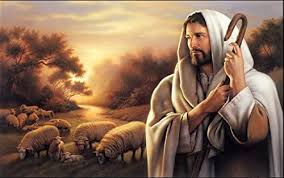

Nimrod #1

Only seven verses in the Bible mention anything about Nimrod. Little is explicitly said about him. He was a mighty warrior, the son of Cush, and the great-grandson of Noah.
However, legends and tales galore have sprung up about this elusive figure. So what do we truly know about Nimrod?
What Did Nimrod Do in the Bible?
Nimrod is mentioned in three passages.
The first and most thorough passage is Genesis 10:8-12:
“Cush was the father of Nimrod, who became a mighty warrior on the earth. He was a mighty hunter before the Lord; that is why it is said, ‘Like Nimrod, a mighty hunter before the Lord.’ The first centers of his kingdom were Babylon, Uruk, Akkad and Kalneh, in Shinar. From that land he went to Assyria, where he built Nineveh, Rehoboth Ir, Calah and Resen, which is between Nineveh and Calah—which is the great city.”
The next time Nimrod appears is in a genealogy at the beginning of 1 Chronicles. His brief listing in 1 Chronicles 1:10 states, “Cush was the father of Nimrod, who became a mighty warrior on earth.”
The final passage also only mentions Nimrod in passing.
Micah 5:5-6 says,
“And he will be our peace when the Assyrians invade our land and march through our fortresses. We will raise against them seven shepherds, even eight commanders, who will rule the land of Assyria with the sword, the land of Nimrod with drawn sword. He will deliver us from the Assyrians when they invade our land and march across our borders.”
From this passage in Micah, we gather that Assyria was still regarded as the land of Nimrod—at least by the people of God—hundreds of years later. However, we learn little about Nimrod himself.
What Is the Meaning of Nimrod’s Name?
The name “Nimrod” has now come to mean a great hunter since Nimrod was identified as a mighty hunter in Genesis 10:9. However, the name probably had a different meaning in the original language.
Some scholars posit that Nimrod actually came from a Semitic root, a language similar to ancient Hebrew. The root appears to be a word roughly Romanized to marad, meaning “to rebel.”
Because of this, Nimrod is often thought to have been a rebel against the Lord.
The phrasing in the Bible that says he was a mighty hunter “before the Lord” (e.g. Genesis 10:9) might more literally be translated “to the face of the Lord”—in other words, in opposition to God. This possible translation may back up Nimrod’s name as The Rebel.
Who Was Nimrod in History?
Theories abound about Nimrod’s life, from Jewish stories and legends to modern interpretations. We will begin with a few things that we can gather with more surety from the biblical text itself.
The genealogies in Genesis 10 and 1 Chronicles 1 distinctly list Nimrod’s lineage. His father was Cush, the son of Noah’s son Ham. Thus, Noah was Nimrod’s great-grandfather.
Only a few generations had passed since the Flood that destroyed the world and washed away all of humanity other than Noah and his family. Due to Ham’s unfortunate behavior in Genesis 9:18-27, Noah cursed Ham’s son Canaan, who was presumably Nimrod’s uncle. However, it does not appear that Noah directly cursed Ham’s other sons. Cush, then, may not have been under the curse.
Nimrod, according to Genesis 20:8, was a “mighty warrior.” The Hebrew word here, gibbor, could potentially also mean “tyrant,” though it is used many other times in the Bible simply to refer to strong warriors or champions, so the potential conclusion that he was tyrannical is tenuous.
Nimrod was presumably some sort of king, as the Bible records the “centers of his kingdom” in Genesis 10:10-12. These include the great cities of Babylon and Nineveh. His kingdom appears to have extended across Sumer, then called Shinar.
After Nimrod established cities in Shinar, Genesis 10:11 records that he went to Assyria built great cities there, including Nineveh. (Crosswalk)
Recommended Messages by John MacArthur
The Destruction of the Final World Religion
https://www.gty.org/library/sermons-library/66-59/the-destruction-of-the-final-world-religion-part-1
https://www.gty.org/library/sermons-library/66-60/the-destruction-of-the-final-world-religion-part-2
https://www.gty.org/library/sermons-library/66-61/the-destruction-of-the-final-world-religion-part-3
https://www.gty.org/library/sermons-library/66-62/the-destruction-of-the-final-world-religion-part-4
Babylon Is Fallen
https://www.gty.org/library/sermons-library/66-63/babylon-is-fallen-part-1
https://www.gty.org/library/sermons-library/66-64/babylon-is-fallen-part-2
https://www.gty.org/library/sermons-library/66-65/babylon-is-fallen-part-3

Babylon and Mystery Babylon
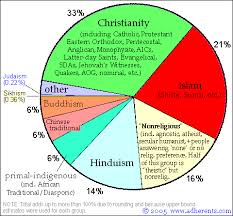 Revelation Chapter 17 evidently refers to the sudden replacement of all world religions by enforced worship of one man: the Antichrist, described in Chapter 13. (“Anti” here appears to mean “instead of” rather that “against” though he is opposed to the real Jesus.) Once he has consolidated power over earth’s nearly 200 nations he will radically revise the world commercial and banking system. This is the subject of Revelation 18. Many have thought His HQ would be Rome but rebuilt Babylon in Iraq now seems more likely. This evil tyrant is thought by some to be a new Nimrod. None of these events can happen until the true church has departed at the Rapture (1 Thessalonians 4). Note that all religion world wide has to be replace by worship of the beast, the Antichrist.
Revelation Chapter 17 evidently refers to the sudden replacement of all world religions by enforced worship of one man: the Antichrist, described in Chapter 13. (“Anti” here appears to mean “instead of” rather that “against” though he is opposed to the real Jesus.) Once he has consolidated power over earth’s nearly 200 nations he will radically revise the world commercial and banking system. This is the subject of Revelation 18. Many have thought His HQ would be Rome but rebuilt Babylon in Iraq now seems more likely. This evil tyrant is thought by some to be a new Nimrod. None of these events can happen until the true church has departed at the Rapture (1 Thessalonians 4). Note that all religion world wide has to be replace by worship of the beast, the Antichrist.
“And all the world marveled and followed the beast.
So they worshiped the dragon who gave authority to the beast;
and they worshiped the beast, saying,
“Who is like the beast?
Who is able to make war with him?”
(Revelation 13:3, 4)
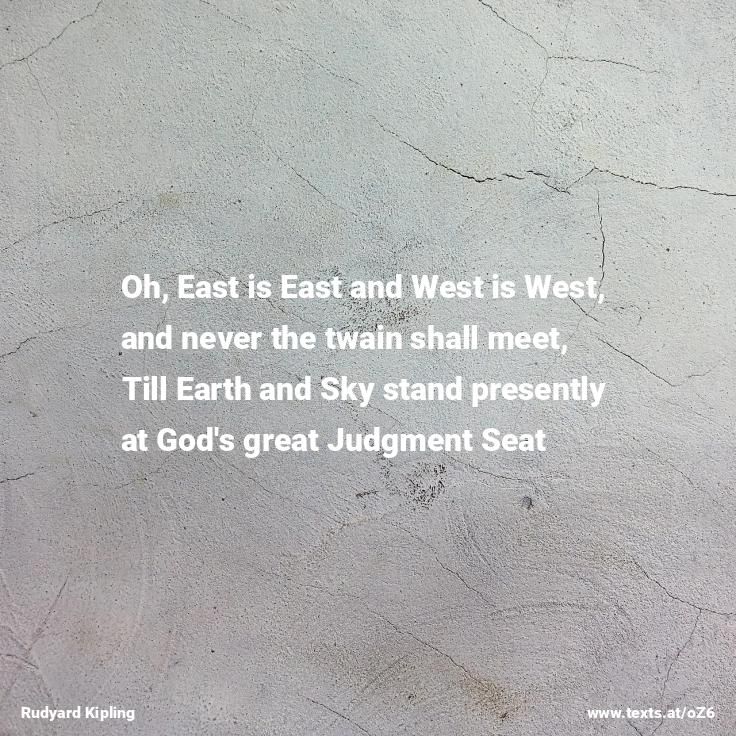
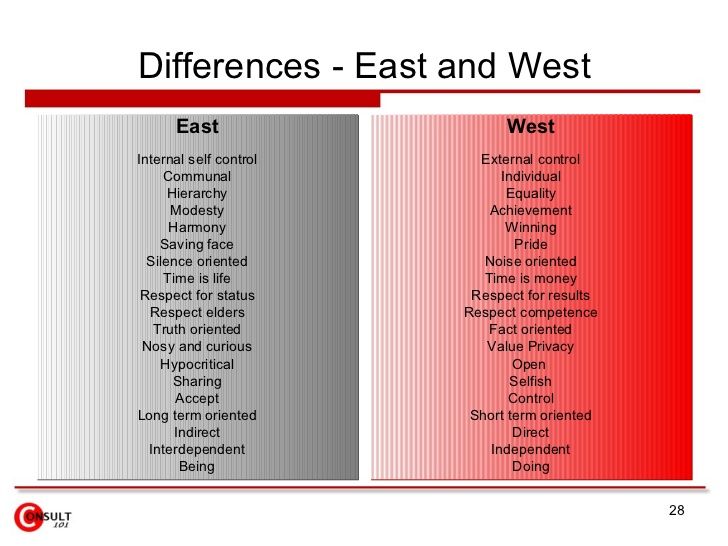

History of the Roman Empire
Roman Catholic Popes
|
Eastern Orthodox Patriarchs
|
- St. Peter (32-67)
- St. Linus (67-76)
- St. Anacletus (Cletus) (76-88)
- St. Clement I (88-97)
- St. Evaristus (97-105)
- St. Alexander I (105-115)
- St. Sixtus I (115-125) Also called Xystus I
- St. Telesphorus (125-136)
- St. Hyginus (136-140)
- St. Pius I (140-155)
- St. Anicetus (155-166)
- St. Soter (166-175)
- St. Eleutherius (175-189)
- St. Victor I (189-199)
- St. Zephyrinus (199-217)
- St. Callistus I (217-22) Callistus and the following three popes were opposed by St. Hippolytus, antipope (217-236)
- St. Urban I (222-30)
- St. Pontian (230-35)
- St. Anterus (235-36)
- St. Fabian (236-50)
- St. Cornelius (251-53) Opposed by Novatian, antipope (251)
- St. Lucius I (253-54)
- St. Stephen I (254-257)
- St. Sixtus II (257-258)
- St. Dionysius (260-268)
- St. Felix I (269-274)
- St. Eutychian (275-283)
- St. Caius (283-296) Also called Gaius
- St. Marcellinus (296-304)
- St. Marcellus I (308-309)
- St. Eusebius (309 or 310)
- St. Miltiades (311-14)
- St. Sylvester I (314-35)
- St. Marcus (336)
- St. Julius I (337-52)
- Liberius (352-66) Opposed by Felix II, antipope (355-365)
- St. Damascus I (366-84) Opposed by Ursicinus, antipope (366-367)
- St. Siricius (384-99)
- St. Anastasius I (399-401)
- St. Innocent I (401-17)
- St. Zosimus (417-18)
- St. Boniface I (418-22) Opposed by Eulalius, antipope (418-419)
- St. Celestine I (422-32)
- St. Sixtus III (432-40)
- St. Leo I (the Great) (440-61)
- St. Hilarius (461-68)
- St. Simplicius (468-83)
- St. Felix III (II) (483-92)
- St. Gelasius I (492-96)
- Anastasius II (496-98)
- St. Symmachus (498-514) Opposed by Laurentius, antipope (498-501)
- St. Hormisdas (514-23)
- St. John I (523-26)
- St. Felix IV (III) (526-30)
- Boniface II (530-32) Opposed by Dioscorus, antipope (530)
- John II (533-35)
- St. Agapetus I (535-36) Also called Agapitus I
- St. Silverius (536-37)
- Vigilius (537-55)
- Pelagius I (556-61)
- John III (561-74)
- Benedict I (575-79)
- Pelagius II (579-90)
- St. Gregory I (the Great) (590-604)
- Sabinian (604-606)
- Boniface III (607)
- St. Boniface IV (608-15)
- St. Deusdedit (Adeodatus I) (615-18)
- Boniface V (619-25)
- Honorius I (625-38)
- Severinus (640)
- John IV (640-42)
- Theodore I (642-49)
- St. Martin I (649-55)
- St. Eugene I (655-57)
- St. Vitalian (657-72)
- Adeodatus (II) (672-76)
- Donus (676-78)
- St. Agatho (678-81)
- St. Leo II (682-83)
- St. Benedict II (684-85)
- John V (685-86)
- Conon (686-87)
- St. Sergius I (687-701) Opposed by Theodore and Paschal, antipopes (687)
- John VI (701-05)
- John VII (705-07)
- Sisinnius (708)
- Constantine (708-15)
- St. Gregory II (715-31)
- St. Gregory III (731-41)
- St. Zachary (741-52) Stephen II followed Zachary, but because he died before being consecrated, modern lists omit him
- Stephen II (III) (752-57)
- St. Paul I (757-67)
- Stephen III (IV) (767-72) Opposed by Constantine II (767) and Philip (768), antipopes (767)
- Adrian I (772-95)
- St. Leo III (795-816)
- Stephen IV (V) (816-17)
- St. Paschal I (817-24)
- Eugene II (824-27)
- Valentine (827)
- Gregory IV (827-44)
- Sergius II (844-47) Opposed by John, antipope
- St. Leo IV (847-55)
- Benedict III (855-58) Opposed by Anastasius, antipope (855)
- St. Nicholas I (the Great) (858-67)
- Adrian II (867-72)
- John VIII (872-82)
- Marinus I (882-84)
- St. Adrian III (884-85)
- Stephen V (VI) (885-91)
- Formosus (891-96)
- Boniface VI (896)
- Stephen VI (VII) (896-97)
- Romanus (897)
- Theodore II (897)
- John IX (898-900)
- Benedict IV (900-03)
- Leo V (903) Opposed by Christopher, antipope (903-904)
- Sergius III (904-11)
- Anastasius III (911-13)
- Lando (913-14)
- John X (914-28)
- Leo VI (928)
- Stephen VIII (929-31)
- John XI (931-35)
- Leo VII (936-39)
- Stephen IX (939-42)
- Marinus II (942-46)
- Agapetus II (946-55)
- John XII (955-63)
- Leo VIII (963-64)
- Benedict V (964)
- John XIII (965-72)
- Benedict VI (973-74)
- Benedict VII (974-83) Benedict and John XIV were opposed by Boniface VII, antipope (974; 984-985)
- John XIV (983-84)
- John XV (985-96)
- Gregory V (996-99) Opposed by John XVI, antipope (997-998)
- Sylvester II (999-1003)
- John XVII (1003)
- John XVIII (1003-09)
- Sergius IV (1009-12)
- Benedict VIII (1012-24) Opposed by Gregory, antipope (1012)
- John XIX (1024-32)
- Benedict IX (1032-45) He appears on this list three separate times, because he was twice deposed and restored
- Sylvester III (1045) Considered by some to be an antipope
- Benedict IX (1045)
- Gregory VI (1045-46)
- Clement II (1046-47)
- Benedict IX (1047-48)
- Damasus II (1048)
- St. Leo IX (1049-54)
- Victor II (1055-57)
- Stephen X (1057-58)
- Nicholas II (1058-61) Opposed by Benedict X, antipope (1058)
- Alexander II (1061-73) Opposed by Honorius II, antipope (1061-1072)
- St. Gregory VII (1073-85) Gregory and the following three popes were opposed by Guibert ("Clement III"), antipope (1080-1100)
- Blessed Victor III (1086-87)
- Blessed Urban II (1088-99)
- Paschal II (1099-1118) Opposed by Theodoric (1100), Aleric (1102) and Maginulf ("Sylvester IV", 1105-1111), antipopes (1100)
- Gelasius II (1118-19) Opposed by Burdin ("Gregory VIII"), antipope (1118)
- Callistus II (1119-24)
- Honorius II (1124-30) Opposed by Celestine II, antipope (1124)
- Innocent II (1130-43) Opposed by Anacletus II (1130-1138) and Gregory Conti ("Victor IV") (1138), antipopes (1138)
- Celestine II (1143-44)
- Lucius II (1144-45)
- Blessed Eugene III (1145-53)
- Anastasius IV (1153-54)
- Adrian IV (1154-59)
- Alexander III (1159-81) Opposed by Octavius ("Victor IV") (1159-1164), Pascal III (1165-1168), Callistus III (1168-1177) and Innocent III (1178-1180), antipopes
- Lucius III (1181-85)
- Urban III (1185-87)
- Gregory VIII (1187)
- Clement III (1187-91)
- Celestine III (1191-98)
- Innocent III (1198-1216)
- Honorius III (1216-27)
- Gregory IX (1227-41)
- Celestine IV (1241)
- Innocent IV (1243-54)
- Alexander IV (1254-61)
- Urban IV (1261-64)
- Clement IV (1265-68)
- Blessed Gregory X (1271-76)
- Blessed Innocent V (1276)
- Adrian V (1276)
- John XXI (1276-77)
- Nicholas III (1277-80)
- Martin IV (1281-85)
- Honorius IV (1285-87)
- Nicholas IV (1288-92)
- St. Celestine V (1294)
- Boniface VIII (1294-1303)
- Blessed Benedict XI (1303-04)
- Clement V (1305-14)
- John XXII (1316-34) Opposed by Nicholas V, antipope (1328-1330)
- Benedict XII (1334-42)
- Clement VI (1342-52)
- Innocent VI (1352-62)
- Blessed Urban V (1362-70)
- Gregory XI (1370-78)
- Urban VI (1378-89) Opposed by Robert of Geneva ("Clement VII"), antipope (1378-1394)
- Boniface IX (1389-1404) Opposed by Robert of Geneva ("Clement VII") (1378-1394), Pedro de Luna ("Benedict XIII") (1394-1417) and Baldassare Cossa ("John XXIII") (1400-1415), antipopes
- Innocent VII (1404-06) Opposed by Pedro de Luna ("Benedict XIII") (1394-1417) and Baldassare Cossa ("John XXIII") (1400-1415), antipopes
- Gregory XII (1406-15) Opposed by Pedro de Luna ("Benedict XIII") (1394-1417), Baldassare Cossa ("John XXIII") (1400-1415), and Pietro Philarghi ("Alexander V") (1409-1410), antipopes
- Martin V (1417-31)
- Eugene IV (1431-47) Opposed by Amadeus of Savoy ("Felix V"), antipope (1439-1449)
- Nicholas V (1447-55)
- Callistus III (1455-58)
- Pius II (1458-64)
- Paul II (1464-71)
- Sixtus IV (1471-84)
- Innocent VIII (1484-92)
- Alexander VI (1492-1503)
- Pius III (1503)
- Julius II (1503-13)
- Leo X (1513-21)
- Adrian VI (1522-23)
- Clement VII (1523-34)
- Paul III (1534-49)
- Julius III (1550-55)
- Marcellus II (1555)
- Paul IV (1555-59)
- Pius IV (1559-65)
- St. Pius V (1566-72)
- Gregory XIII (1572-85)
- Sixtus V (1585-90)
- Urban VII (1590)
- Gregory XIV (1590-91)
- Innocent IX (1591)
- Clement VIII (1592-1605)
- Leo XI (1605)
- Paul V (1605-21)
- Gregory XV (1621-23)
- Urban VIII (1623-44)
- Innocent X (1644-55)
- Alexander VII (1655-67)
- Clement IX (1667-69)
- Clement X (1670-76)
- Blessed Innocent XI (1676-89)
- Alexander VIII (1689-91)
- Innocent XII (1691-1700)
- Clement XI (1700-21)
- Innocent XIII (1721-24)
- Benedict XIII (1724-30)
- Clement XII (1730-40)
- Benedict XIV (1740-58)
- Clement XIII (1758-69)
- Clement XIV (1769-74)
- Pius VI (1775-99)
- Pius VII (1800-23)
- Leo XII (1823-29)
- Pius VIII (1829-30)
- Gregory XVI (1831-46)
- Blessed Pius IX (1846-78)
- Leo XIII (1878-1903)
- St. Pius X (1903-14)
- Benedict XV (1914-22) Biographies of Benedict XV and his successors will be added at a later date
- Pius XI (1922-39)
- Pius XII (1939-58)
- St. John XXIII (1958-63)
- Paul VI (1963-78)
- John Paul I (1978)
- St. John Paul II (1978-2005)
- Benedict XVI (2005-2013)
- Francis (2013—)
|
Late Antiquity, as noted in the bibliography below.[3][4]
- Peter I (c. 37/47–c. 53/54)[5]
- Evodius (c. 53/54–c. 68/83)[nb 1]
- Ignatius (c. 68–c. 107 or c. 83–115)[nb 2]
- Heron I (c. 107/116–c. 127/128)[nb 3]
- Cornelius (c. 127/128–c. 142/154)[nb 4]
- Heron II (c. 142–c. 169 or c. 154–c. 164)[nb 5]
- vacant (c. 164–c. 169)[nb 6]
- Theophilus (c. 169–182)[nb 7]
- Maximus I (182–190/191)[nb 8]
- Serapion (190/191–211/212)[nb 9]
- Asclepiades (211/212–217/218/220)[nb 10]
- Philetus (217/218/220–230/231)[nb 11]
- Zebinnus (230/231–237)[nb 12]
- Babylas (237–250/251)[nb 13]
- Fabius (250/251–253/256)[nb 14]
- Demetrius (253/256–260/261)[nb 15]
- Paul (260/261–268/272)[nb 16]
- Domnus I (268–273)[nb 17]
- Timaeus (273–279/280)[nb 18]
- Cyril (279/280–303)[nb 19]
- Tyrannion (304–314)
- Vitalis (314–320)[nb 20]
- Philogonius (320–324)
Patriarchs of Antioch from 324 to 360[edit]
- Eustathius (324–330)
- Paulinus I (330)[nb 21]
- Eulalius (331–332)
- Euphronius (332–333)
- Flacillus (333–342)[nb 22]
- Stephen I (342–344)
- Leontius (344–357)[nb 23]
- Eudoxius (358–359)
- Annanius (359)
Patriarchs of Antioch from 360 to 414[edit]
Patriarchs of Antioch from 414 to 518
- Alexander (414–417)[nb 26]
- Theodotus (417–428)[nb 27]
- John I (429–441)[nb 28]
- Domnus II (441–449)[nb 29]
Non-Chalcedonian line
- Maximus II (450–455)[nb 30]
- Basil (456–458)[nb 31]
- Acacius (458–459)[nb 32]
- Martyrius (459–471)[nb 33]
- Peter II (471)[nb 34]
- Julian (471–475)[nb 35]
- Peter II (475–477)[nb 36]
- John II Codonatus (477)[nb 37]
- Stephen II (477–479)[nb 38]
- Stephen III (disputed)[nb 39]
- Calendion (479–484)[nb 40]
- Peter II (485–488)[nb 41]
- Palladius (488–498)[nb 42]
- Flavian II (498–512)
- Severus (512–518)
Patriarchs of Antioch from 518 to present
Syriac patriarchs from 512 to 1292[edit]
Unless otherwise stated, all information is from the Gorgias Encyclopedic Dictionary of the Syriac Heritage, and the list provided in The Syriac World, as noted in the bibliography below. Numeration includes incumbents deemed legitimate by the Syriac Orthodox Church prior to the schism in 518.[1]
- Severus I (512–538)[nb 1]
- vacant (538–c. 544/557)
- Sergius of Tella (c. 544–c. 547; c. 557–560)[nb 2]
- vacant (c. 547–c. 551; 560–564)
- Paul II (c. 551/564–578)[nb 3]
- vacant (578–581)[nb 4]
- Peter III (578/581–591)[nb 5]
- Julian II (591–594)[nb 6]
- vacant (594–603)[nb 7]
- Athanasius I Gammolo (594/595/603–631)[nb 8]
- John III (631–648)[nb 9]
- Theodore (649–666/667)
- Severus II bar Masqeh (667/668–680/684)[nb 10]
- vacant (680–684)[nb 11]
- Athanasius II Baldoyo (683/684–687)
- Julian III (687–707/708)[nb 12]
- Elias I (709–723/724)
- Athanasius III (724–739/740)
- Iwannis I (739/740–754/755)[nb 13]
- Isaac I (755–756)[nb 14]
- Athanasius Sandalaya (756–758)[nb 15]
- George I (758/759–789/790)[7]
- John of Raqqa (758–762)[nb 16]
- David of Dara (762–774)[nb 17]
- Joseph (790–791/792)[7]
- Quriaqos of Tagrit (793–817)
- Abraham (807/808–837)[nb 18]
- Dionysius I Telmaharoyo (818–845)
- Simeon (c. 837)[nb 19]
- John IV (846/847–873/874)[nb 20]
- vacant (874–878)
- Ignatius II (878–883)[nb 21]
- vacant (883–887)
- Theodosius Romanus (887–896)
- vacant (896–897)[nb 22]
- Dionysius II (896/897–908/909)[7]
- John V (910–922)[nb 23]
- Basil I (923–935)
- John VI (936–953)
- Iwannis II (954–957)[nb 24]
- Dionysius III (958–961)
- Abraham I (962–963)
- vacant (963–965)
- John VII Sarigta (965–985)[nb 25]
- Athanasius IV Salhoyo (986/987–1002/1003)[nb 26]
- John VIII bar Abdoun (1004–1030/1031/1033)[nb 27][11]
- Dionysius IV Yahyo (1031–1042)
- vacant (1042–1049)[nb 28]
- John IX bar ʿAbdun (1042/1048/1049–1057)
- Athanasius V Yahyo (1057/1058–1062/1064)[nb 29]
- John X bar Shushan (1063/1064–1072/1073)[nb 30]
- Basil II (1074–1075)[nb 31]
John bar ʿAbdun (1075–1076/1077)[nb 32]
- Dionysius V Lazarus (1077–1078/1079)
vacant (1078/1079–86)
- Iwannis III (1086–1087/1088)
- Dionysius VI (1088–1090)
- Athanasius VI bar Khamoro (1090/1091–1129)[nb 33][13]
- John XI bar Mawdyono (1129/1130–1137)[nb 34]
- Athanasius VII bar Qatra (1138/1139–1166)[nb 35]
- Michael I (1166–1199)
- Theodore bar Wahbun (1180–1193)[nb 36]
- Athanasius VIII bar Salibi (1199–1207)[nb 37]
- Michael II the Younger (1199/1200–1215)[nb 38]
- John XII (1207/1208–1219/1220)[nb 39]|
vacant (1220–1222)
- Ignatius III David (1222–1252)
- Dionysius VII ʿAngur (1252–1261)[16]
- John XIII bar Ma'dani (1252–1263)[nb 40]
- Ignatius IV Yeshu (1264–1282/1283)
- Philoxenus I Nemrud (1283–1292)
Syriac patriarchs from 1292 to 1445
On the death of Patriarch Philoxenus I Nemrud in 1292, the Syriac Orthodox Church split into the patriarchates of Antioch, Mardin, and Melitene. A separate patriarchate of Tur Abdin broke off from the patriarchate of Mardin in 1364. The patriarchate of Melitene ended in c. 1360, and the patriarch of Mardin Ignatius Behnam Hadloyo was acknowledged as the patriarch of Antioch in 1445, thus ending the schism.
Patriarchate of Antioch
- Michael II (1292–1312)[nb 41]
- Michael III Yeshu (1313–1349)[nb 42]
- Basil III Gabriel (1349–1387)
- Philoxenus II (1387–c. 1421)
- Basil IV Simon (1421/1422–1444/1445)
|
Patriarchate of Mardin
|
Patriarchate of Melitene
- Ignatius Constantine (1292–1293)
- Ignatius Philoxenus (1349–c. 1360)
|
Patriarchate of Tur Abdin (1364–1840)
Syriac patriarchs from 1445 to 1782
- Ignatius Behnam Hadloyo (1445–1455)
- Ignatius Khalaf Maʿdnoyo (1455/1456–84)[nb 48]
- Ignatius John XIV (1484–1493)[nb 49]
- Ignatius Noah of Lebanon (1493/1494–1509)
- Ignatius Yeshu I (1509–1510/1519)[nb 50]
- Ignatius Jacob I (1510/1512–1517/1519)[nb 51]
- Athanasius bar Subay (1511–between 1514 and 1518)[nb 52]
- Ignatius David I (1519–1521)[nb 53]
- Ignatius Abdullah I (1521–1557)
- Ignatius Ni'matallah (1557–1576)
- Ignatius David II Shah (1576–1591)
- Ignatius Pilate (1591–1597)
- Ignatius Hidayat Allah (1597/1598–1639/1640)
- Ignatius Simon (1640–1653)
- Ignatius Shukrallah I (1640–1670)[nb 54]
- Ignatius Yeshu II (1653/1655–1661)[nb 55]
- Ignatius Abdulmasih I (1661/1662–1686)
- Ignatius George II (1687–1708)
- Ignatius Isaac II (1709–1722)
- Ignatius Shukrallah II (1722/1723–1745)
- Ignatius George III (1745/1746–1768)
- Ignatius George IV (1768–1781)
Syriac Orthodox patriarchs from 1782 to present
- Ignatius Matthew (1782–1817/1819)
- Ignatius Yunan (1817–1818)[25]
- Ignatius George V (1819–1836/1839)
- Ignatius Elias II (1836/1839–1847)
- Ignatius Jacob II (1847–1871)
- Ignatius Peter IV (1872–1894)[nb 56]
- Ignatius Abdulmasih II (1894/1895–1903)[nb 57]
- Ignatius Abdullah II (1906–1915)
vacant (1915–1917)
- Ignatius Elias III (1917–1932/1933)
- Ignatius Aphrem I (1933–1957)
- Ignatius Jacob III (1957–1980)
- Ignatius Zakka I (1980–2014)
- Ignatius Aphrem II (2014–present)
|

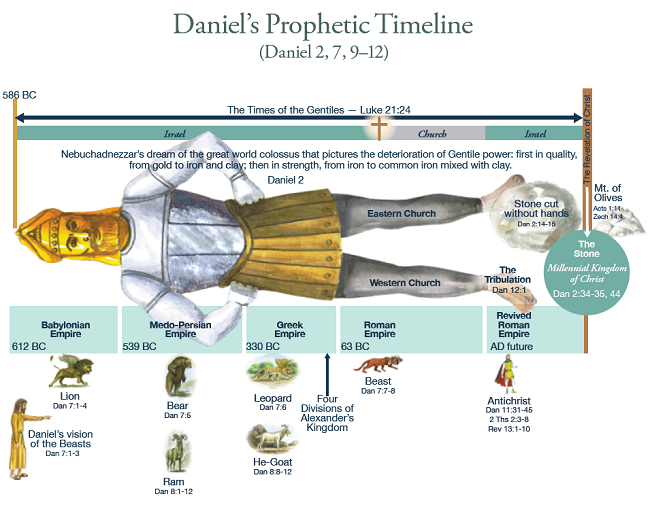
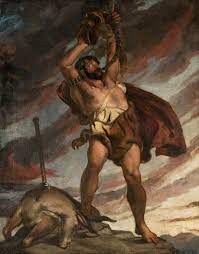
The Return of Nimrod?
The Coming World Leader
by Chuck Missler
One of the dominant topics among prophecy buffs is the identity of the coming leader whom we call "the Antichrist." As current events seem to be increasingly drawing us into the threshold of the climactic Biblical scenario, speculations continue.
One of the most fundamental passages concerning the end times is the famous "Seventy Weeks" prophecy contained in the last four verses of Daniel 9. The Angel Gabriel interrupts Daniel's prayer to provide him with what has to be the most astonishing passage in the entire Bible: he predicts the precise day-five centuries in advance-the exact day that the Messiah would present Himself as king!
In describing an interval between the contiguous group of years of 69 weeks (of years), and the final "70th week," we notice that the Angel Gabriel declares that the:
Messiah be cut off, but not for himself: and the people of the prince that shall come shall destroy the city and the sanctuary - Daniel 9:26
After the Messiah is killed ("cut off"), the "people of the Prince that shall come" shall destroy the city and the sanctuary. This, of course, was fulfilled when Jerusalem and the Temple were destroyed by the Roman legions in A.D. 70.
"The Prince that shall come," thus becomes one of the 33 titles in the Old Testament of the coming world leader that will figure so prominently in end-time prophecies.
This also becomes one of several passages which indicates that this final world leader will emerge out of the Roman Empire, whose legions destroyed Jerusalem and the Temple.
All of us, I suspect, tend to equate the Roman Empire with Western Europe, and there have been many books suggesting conjectures involving Rome, the Vatican, and the rise of the European Union, etc.
In A.D. 284 , Emperor Diocletian restored efficient government to the empire after the near anarchy of the 3rd century. He divided the Empire into two legs (just as Daniel had predicted when he interpreted Nebuchadnezzar's dream nine centuries earlier).
His reorganization of the fiscal, administrative and military machinery of the empire temporarily shored up the decaying empire in the West and laid the foundation for the forthcoming Byzantine Empire of the East.
In A.D. 312, the Emperor Constantine relocated the capital of the empire to its eastern leg, to Byzantium, naming it Constantinople (the "New Rome").
After Constantine's death in 395, Emperor Theodosius divided the empire between his two sons and it was never again reunited.
(It was Theodosius who made Christianity the sole religion of the empire, and subsequently Constantinople assumed preeminence over the West.)
In the late 5th century, the western leg began to disintegrate, but the eastern leg, commonly dubbed the "Byzantine Empire," endured until 1453 when it finally was overrun by the Muslims.
There are a number of Biblical texts that strongly suggest that the coming world leader, commonly called the Antichrist, will emerge from the region of the eastern leg of the Roman Empire, and that profoundly impacts our prophetic perspectives.
Daniel 11
Our clearest identification comes from prophecies relating to the precedent empire: the breakup of the Greek Empire after Alexander's death.
When Alexander the Great died, his four generals divided up the empire-which reached eastward even to India. Cassander took Macedonia and Greece; Lysimachus took Asia Minor and Thrace; Seleucus took over Syria, Babylon and the east; and, Ptolemy took over Egypt.
Since Israel was caught between the territories of Seleucus and Ptolemy, it subsequently was a buffer zone between these two rivals. Daniel Chapter 11 details the struggles between the Seleucid Empire ("the king of the north") and the Ptolemies ("the king of the south").
The first 35 verses of Daniel 11 are summarized in [Table 1]. From verses 36-40, the passage focuses on Antiochus IV ("Epiphanes") whose desecration of the Temple, and placing a pagan idol in the Holy of Holies (the "abomination of desolation"), triggered the Maccabean Revolt that threw off the yoke of the Seleucid Empire.
Three years after that infamous desecration, the Israelites rededicated the Temple, and this event is celebrated to this day on the 25th of Kislev as
Two centuries later, when four disciples came to Jesus for a confidential briefing on His Second Coming, Jesus referred to a repeat of that historical event, the "abomination of desolation," as the key to end-time prophecy. A similar event will trigger the climactic three-and-a-half-year period that Jesus Himself labeled as the "Great Tribulation."
In Daniel 11:40-45, the passage continues by looking forward to the final "king of the north," to the person we commonly call the Antichrist. It is significant that this climactic leader seems to be presented as the final member of this previous detailed line of the "kings of the north."
It would seem, taking the chapter as a whole, that the final world leader will emerge from this region which comprised the Seleucid empire, rather than from the western regions as commonly assumed.
"The Assyrian"
It is provocative that the Prophet Micah refers to this final conqueror as the "Assyrian":
And this [one] shall be the peace, when the Assyrian shall come into our land: and when he shall tread in our palaces, then shall we raise against him seven shepherds, and eight principal men. And they shall waste the land of Assyria with the sword, and the land of Nimrod in the entrances thereof: thus shall he deliver us from the Assyrian, when he cometh into our land, and when he treadeth within our borders. - Micah 5:5, 6
Isaiah and Ezekiel also employ this very term.10
The Assyrian empire preceded the Babylonian empire by several centuries. This empire embraced the region we know today as Syria and Iraq.
The first world dictator was Nimrod (whose name means "we rebel"), who ruled from Babylon. 11 It is interesting that Micah also refers to this "land of Nimrod" in his passage quoted above. Could it be that this final world dictator will be, in some sense, a return of Nimrod?
This may add an additional dimension to the mysteries surrounding the future of Babylon: is it just used as a symbol, or will Babylon literally rise to prominence on the banks of the Euphrates once again?
Isaiah and Jeremiah clearly describe a destruction of Babylon that has never happened-yet. Zechariah seems to hold the key. |


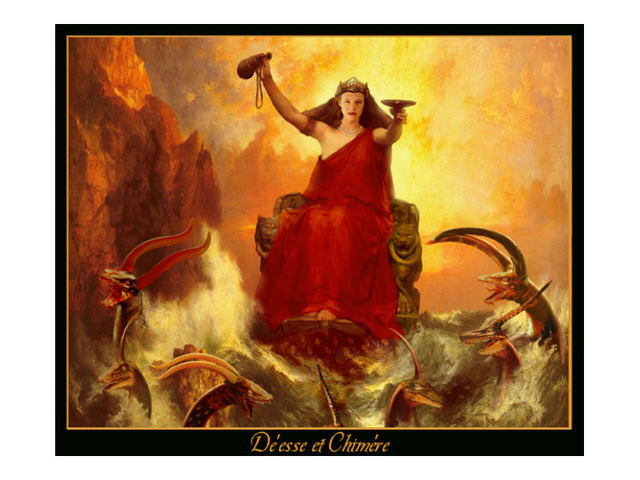
False Religion
False religion rose into prominence in history when Nimrod, son of Cush, son of Ham, son of Noah, rose to power in ancient Babylon about 4500 years ago. (The total world population then was about one hundred thousand, perhaps one million persons, and everyone spoke one common language.) Nimrod's wife or consort was Semiramis, who initiated a religious cult of the adoration of Mother and Child. Nimrod's great tower was intended reach up to heaven to bring God down to man.
Cush begot Nimrod; he began to be a mighty one on the earth. He was a mighty hunter before the Lord; therefore it is said, “Like Nimrod the mighty hunter before the Lord.” And the beginning of his kingdom was Babel, Erech, Accad, and Calneh, in the land of Shinar. From that land he went to Assyria and built Nineveh, Rehoboth Ir, Calah, and Resen between Nineveh and Calah (that is the principal city). (Genesis 10:8-12)
...Now the whole earth had one language and one speech. And it came to pass, as they journeyed from the east, that they found a plain in the land of Shinar, and they dwelt there. Then they said to one another, “Come, let us make bricks and bake them thoroughly.” They had brick for stone, and they had asphalt for mortar. And they said, “Come, let us build ourselves a city, and a tower whose top is in the heavens; let us make a name for ourselves, lest we be scattered abroad over the face of the whole earth.”
But the Lord came down to see the city and the tower which the sons of men had built. And the Lord said, “Indeed the people are one and they all have one language, and this is what they begin to do; now nothing that they propose to do will be withheld from them. Come, let Us go down and there confuse their language, that they may not understand one another’s speech.” So the Lord scattered them abroad from there over the face of all the earth, and they ceased building the city. Therefore its name is called Babel, because there the Lord confused the language of all the earth; and from there the Lord scattered them abroad over the face of all the earth.” (Genesis 11:1-9)
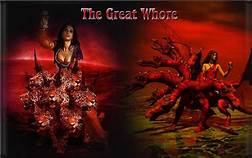
God's Funnel
From Ray Stedman, "We shall take the family of Ham in two sections, briefly commenting on certain items:
The sons of Ham: Cush, Egypt, Put, and Canaan. The sons of Cush: Seba, Havilah, Sabtah, Raamah, and Sabteca. The sons of Raamah: Sheba and Dedan. Cush became the father of Nimrod; he was the first on earth to be a mighty man. He was a mighty hunter before the LORD; therefore it is said, "Like Nimrod a mighty hunter before the Lord." The beginning of his kingdom was Babel, Erech, and Accad, all of them in the land of Shinar. From that land he went into Assyria, and built Nineveh, Reho'both-Ir, Calah, and Resen between Nineveh and Calah; that is the great city. Egypt became the father of Ludim, Anamim, Lehabim, Naphtuhim, Pathrusim, Casluhim (whence came the Philistines), and Caphtorim. (Genesis 10:6-14 RSV)
The four sons of Ham are relatively easy to trace in history: Cush is associated with the peoples of Southern Arabia and Ethiopia. Ethiopians still trace their ancestry back to Cush. Egypt is self explanatory. Egypt (or Mizraim in Hebrew, an ancient name for Egypt) became the father of the Egyptian Empire, settling in the Nile Valley. Put is associated with Lydia, on the west of Egypt, in North Africa. Canaan centered largely in and around Palestine, though the Canaanites later became much more widespread, as this account tells us further on.
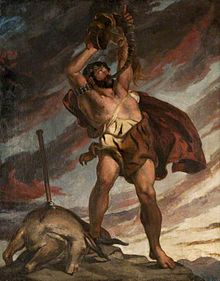 The account zooms in on an individual named Nimrod, who is called a great hunter. He is a rather mysterious figure, of great importance in ancient history. He is the founder, as we are told, of both Babylon and Nineveh, the two great cities of antiquity which ultimately became enemies of Israel. The prominent thing said about him here is that he was a mighty man, "a mighty hunter before the LORD." Now it was the work of kings in those ancient days to be hunters. This was a time when civilization was sparse and wild animals were a constant threat to the peoples. Kings, having nothing much else to do, organized hunting parties and acted as the protectors of their people by killing wild animals. Nimrod evidently gained a great reputation as such a hunter, but he was more than a hunter of wild animals. The Jewish Talmud helps us here, for it says that he was "a hunter of the souls of men." The account zooms in on an individual named Nimrod, who is called a great hunter. He is a rather mysterious figure, of great importance in ancient history. He is the founder, as we are told, of both Babylon and Nineveh, the two great cities of antiquity which ultimately became enemies of Israel. The prominent thing said about him here is that he was a mighty man, "a mighty hunter before the LORD." Now it was the work of kings in those ancient days to be hunters. This was a time when civilization was sparse and wild animals were a constant threat to the peoples. Kings, having nothing much else to do, organized hunting parties and acted as the protectors of their people by killing wild animals. Nimrod evidently gained a great reputation as such a hunter, but he was more than a hunter of wild animals. The Jewish Talmud helps us here, for it says that he was "a hunter of the souls of men."
By the founding of Babylon and Nineveh we have a hint given of the nature of this man. We are told here that he was "the first mighty man on earth," i.e., after the Flood. That phrase, "mighty man" takes us back to Genesis 6 where, in that strange story of the invasion of the "sons of God" into the human race, there resulted a race of giants called Nephilim. We are told that, "these were the mighty men that were of old, the men of renown." This was evidently a demonic invasion of the race, with sexual overtones, which brought into being a race of giants that were morally degraded. These also appear later on in the Canaanite tribes. We have found this suggestive line of thought running through the Scriptural account up to this point. It now suggests that Nimrod was one of these "mighty men," and therefore introduced a perverted, degraded form of religion into the world. It began at Babylon, spread to Nineveh, and can be traced in history as it subsequently spread throughout the whole of the earth. Thus, in this man Nimrod, we have the seed of idolatry and false religion coming in again after the Flood.
If you drop the first consonant of Nimrod's name and take the others -- M, R, D -- you will have the basic root of the god of Babylon, whose name was Marduk, and whom most scholars identify with Nimrod. In the Babylonian religion, Nimrod (or Marduk) held a unique place. His wife was Semiramis. (Some of you who have been at Cairo have stayed at the Semiramis Hotel, which is named after her.) Marduk and Semiramis were the ancient god and goddess of Babylon. They had a son whom Semiramis claimed was virgin-born, and they founded the mother and child cult. This was the central character of the religion of ancient Babylon, the worship of a mother and child, supposedly virgin born. You can see in this a clever attempt on the part of Satan to anticipate the genuine virgin birth and thus to cast disrepute upon the story when the Lord Jesus would later be born into history. This has been the effect of it.
This ancient Babylonian cult of the mother and child spread to other parts of the earth. You will find it in the Egyptian religion as Isis and Osiris. In Greece it is Venus and Adonis and in Hindu it is Ushas and Vishnu. The same cult prevails in various other localities. It appears in the Old Testament in Jeremiah, where the Israelites are warned against offering sacrifices to "the Queen of Heaven." This Queen of Heaven is Semiramis, the wife of Nimrod, the original mother of the mother and child cult. The cult has also crept into Christianity and forms the basis for the Mariolatry that has prevailed in the Roman Catholic Church, where the Mother and Child are worshiped as joint redeemers.
If you would like to read more on this, there is a book by Alexander Hislop, a very authoritative writer in this field, called The Two Babylons. I am sure you will find it of great interest if you desire to pursue this further.
This idolatrous religion culminates at last in the Bible in the book of Revelation. You remember the "great harlot" that appears there whose name is "Mystery Babylon the Great," the originator of all the harlotries and false religions of earth. The essence of Babylonianism, as we understand from Scripture, is the attempt to gain earthly honor by means of religious authority. That is Babylonianism, and it has pervaded Christian churches, Hindu temples, Buddhist shrines, and Mohammedan mosques. Everywhere it is the element that marks falseness in religion, this attempt to gain earthly power and prestige by means of religious authority. That is Babylonianism. That is what Nimrod began and what God will ultimately destroy, as we read in the book of Revelation.
The land of Shinar, mentioned here, is also the land of Shunar or Shumar, from which we get the word, Sumeria, and the Sumerian civilization, with which scholars are familiar. The city of Resen was founded by people who later migrated into the north of Italy and began the great Etruscan Empire, which again is familiar to any who study ancient history. We also have here the countries that came from Egypt and are associated with it here, all of which are countries of North Africa." God's Funnel, by Ray Stedman.
After the confusion of languages ('tongues') at Babel, the residents dispersed to the four corners of the world (as God had originally intended).
The Babylonian Mystery Religion went with them.
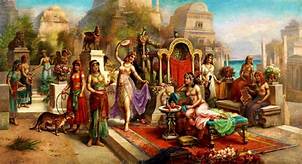
Three main streams of this religion are discernible. One branch was taken to China and India--the fount there we now know as Hinduism, Buddhism, Confucianism, and the like. A second stream initiated the Egyptian Mystery Religion. Branch Three was exported into Europe via the Etruscan Mystery Religion --and from there incorporated into the Church of Rome.
The myth of "great civilizations" down through history is easily dismissed when one realizes that everyone is incurably religious and that pure paganism underlies the facades in every culture and every generation.
"Alexander Hislop, The Two Babylons is the classic work on Babylon then and now. My friend Bryce Self has written on Semiramis, and on related matters about Babylon Nimrod, Mars, and the Marduk Connection. Noah Hutchings recognizes that God will purge all traces of this ancient demonic system from the world--soon. See Babylon, Its Coming Destruction.
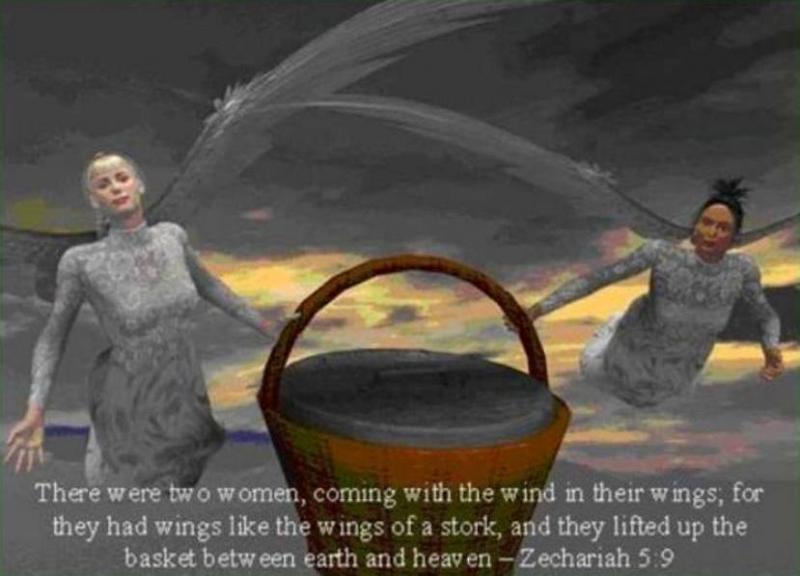
The Woman and the Ephah
Since the wellspring of Babylon's evil religious system can be traced back to Semiramis, we ought not to be surprised that the Hebrew prophet Zechariah foresaw this great vision.
“Then, in Scene Four, Zechariah sees a woman in an ephah. An ephah is like a big bushel basket, and while the prophet and the angel watched, wings were given to this basket and it flew away to the land of Babylon. What does this strange thing mean? If you had a vision like that you would wonder what you had been eating the night before! But the prophet knows that a meaningful vision has been given to him. As he meditates upon it, he can understand it because it contains terms that are used elsewhere in the Scripture. Whenever a woman appears symbolically in Scripture, there is always reference to something wrong in the realm of religion. (I did not invent that, the Scriptures did.) Here, then, is the picture of the judgment of the false faith, the false church, very much as we find in the book of Revelation where a woman who is the false church is called Babylon the great. Zechariah sees the same thing: God's judgment upon hypocritical religion, false faith.” --Ray Stedman.
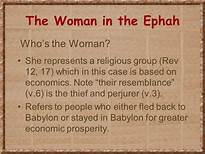
Removing Wickedness from the World All At Once
Removing Wickedness from Israel (Zechariah 5:5-11): The seventh vision depicts the removal of wickedness from the land of Judah to Babylon. Sin, symbolized as a woman, since wickedness is a feminine word, is thrust into an ephah, sealed with a lead disc, and carried by two women to the ancient land of Shinar (modern day Babylon/Iraq).
As in vision six, God will move against evil in two dramatic acts. These two acts are:
A. Wickedness Will Be Placed Under Wraps 5:5-8
B. Wickedness Will Be Housed in Babylon 5:9-11
WICKEDNESS WILL BE PLACED UNDER WRAPS (5:5-8): This time the prophet is shown "a basket that is going forth" (v. 6). The weight and measurements of this "basket," or "ephah," like most from that time, are difficult to describe. The ephah held somewhere between 3/8 to 2/3 of a U.S. bushel. By any estimate, it was too small for any woman to fit into. But that fact is not all that significant for apocalyptic literature where it is not necessary for the images, especially those that occur in dreams or visions, to conform in all aspects to reality.
When Zechariah, true to his previous form, asks "What is it?", he is told that "This is Wickedness!" (v. 8). Wickedness stood for everything that was the opposite of righteousness--whether in the ethical, civil or religious realm. This was wickedness personified. (The possible connection between Babylon being the ancient center of mercantile commercialism and its current ascendancy to the center of the economic forces through the oil cartel should not be missed.)
To make the image of the personified wickedness even more vivid, wickedness is depicted as "a woman sitting inside [a] basket" (v. 7). The picture is reminiscent of a kind of genie in a jar. This woman's influence would be capped by the "lead disc" (v. 7). Surely that would be God's concluding act of placing wickedness under wraps.
Wickedness had grown to such proportions that it looked as if iniquity came by the bushel-fulls. But no longer would it prevail; in God's concluding acts of history He would remove the wicked (vision six) and, as this vision shows, wickedness itself.
WICKEDNESS WILL BE HOUSED IN BABYLON (5:9-11): In the second half of this vision, the prophet suddenly sees "two women, coming with the wind in their wings; for they had wings like the wings of a stork" (v. 9bc). The Hebrew word for "stork" is hasida, meaning "faithful one," and is similar to the Hebrew word for "grace," hesed. The faithful one--the stork--may symbolize God's gracious removal of sin and iniquity from His people, just as God had removed the sin of the dung-spattered High Priest Joshua by His "grace" (Zachariah 3:4).
The woman in the ephah will be removed to "Shinar," the ancient name for that part of Babylon that contained such cities as Babel (Babylon), Erech, Accad, and Calneh (Gen. 10:10; 11:2; Dan. 1:2). This was the area that from earliest times was opposed to the will of God (Gen. l1:1-9). In this land, which had also served most recently as the place of Judah's captivity, God would "build a house for [wickedness]" (v. 11).
God would give wickedness a home far removed from His people. A home like the ancient ziggurats, exhibited first, perhaps, in the tower of Babel. "When it is ready, the basket will be set there on its base" (v. l1c). Once located on its "base," or "pedestal," wickedness would be worshiped like the idol it was for those who had so consistently resisted God's will.
Given the part that Babylon plays in the eschatological drama of the closing days of this present age, the removal of wickedness to Babylon might have been in preparation for the final conflict between good and evil. Isaiah 13-14, and, especially, Jeremiah 50-51, place a revived Babylonian empire at the center of the final contest between God and "all the nations of the earth" that have been gathered into the Near East for history's finale. But God will triumph, for He has full control over evil. That can be seen in His ability to pack up evil and literally ship it to the center of wickedness where He is able to deal with it conclusively at the end of the age.
The Woman and the Ephah
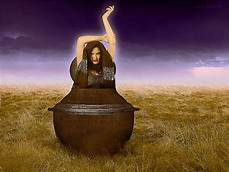 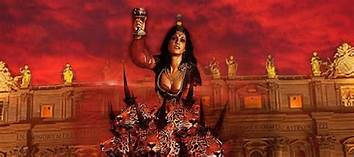
It is important to see that Mystery Babylon the Great is not only about false religion in the world. The economic, business, industry, banking, and power centers of society will shortly fall as well. Probably most preachers avoid speaking of this for fear of undermining their own power base, income, and retirement plans. Every one on earth is implicated of course!
Revelation 18 has been greatly neglected!
"The love of money is a root of all evils..." (1 Timothy 6:10) (See Riches)
Ancient Babylon is a vast subject in the Bible! The story is not limited to the Tower and the supernatural confusion of language recorded in Genesis. The poison stream of false religion (the Babylonian mystery religion) spread to Tyre in Phoenicia where the roots sank deeply into human emotions related to commerce and trade.
The fall of a mighty archangel, Lucifer, is recorded cryptically in Isaiah 13-14, Ezekiel, 26-28, and Jeremiah 50-51. In passages concerning Tyre, history has much to teach anyone who wants to dig a bit further!
Ray Stedman summarized highlights of Babylon and Tyre in his studies on Isaiah in 1986.
“That question is answered many times in the Scriptures, but notably here in this section of Isaiah, beginning with Chapter 13. In these chapters the prophet is given a vision concerning the great world powers that surrounded Israel in that day. The prophecy begins with a word concerning Babylon; then focuses on Assyria, Moab, Egypt, Edom and other nations; and ends in Chapter 23 with the burden of the city-nation of Tyre.
These messages were wholly predictive when they were uttered. They point out things that are going to happen from Isaiah's time onward. As we look back on history we can see that much of this prophecy has already been fulfilled. One of the secrets of understanding Old Testament prophecy is to separate the historic from the yet still future. These nations are not only historic but are symbols of forces at work in every age and every generation. What makes this passage so real and valuable to us is that through the experience of these nations we begin to understand our own personal struggles.
I wish I could cover these passages in detail, but I must move rather rapidly. Chapters 13 and 14 concern the city of Babylon; "the burden of Babylon," or, "the oracle concerning Babylon," as it is in the RSV. When Isaiah wrote this, Babylon was not yet a world power but only a small city on the banks of the Euphrates River. It would not come into world prominence for 200 years after Isaiah. What the prophet is describing here is not the rise of Babylon as a great city and world power, but the fall of the empire. The chapter opens in beautiful poetic language with a description of an army assaulting the gates of the city, and the summons comes from God to enter its gates and capture the city. This is historically fulfilled in Chapter 5 of the book of Daniel. There is recorded the story of the conquering of Babylon under its king, Belshazzar. During a great feast which the king gave in the palace he brought out the vessels from the temple in Jerusalem and used them in riotous debauchery. A supernatural hand appeared and wrote on the wall, "Mene, Mene, Tekel, Upharsin," meaning, "Your kingdom has been numbered and divided among the Medes and Persians."
That very night Darius the Mede took the city, just as Isaiah predicts. I will call your attention only to certain verses in this section. In Verse 6 the prophet says:
Wail, for the day of the Lord is near;
as destruction from the Almighty it will come! (Isaiah 13:6 RSV)
Isaiah labels this time of the fall of Babylon as a manifestation of "the day of the Lord," a time of judgment from God, even though that judgment came at the hands of another nation. This is God's process throughout history: he uses one nation to judge another. In World War II, he used Hitler to judge the nations of the world; then he used the other nations to judge Germany under Hitler. Here this judgment is called "the day of the Lord."
In Verse 9 Isaiah repeats this phrase, but he is now talking about a future "day of the Lord," the final, terrible "Day of the Lord." Notice how the language expands here:
Behold, the day of the Lord comes,
cruel, with wrath and fierce anger,
to make the earth [not the land, but the Earth] a desolation
and to destroy its sinners from it.
For the stars of the heavens and their constellations
will not give their light;
the sun will be dark at its rising
and the moon will not shed its light.
I will punish the world [not just the Earth but the World] for its evil,
and the wicked for their iniquity;
I will put an end to the pride of the arrogant,
and lay low the haughtiness of the ruthless.
I will make men more rare than fine gold,
and mankind than the gold of Ophir.
Therefore I will make the heavens tremble,
and the earth will be shaken out of its place,
at the wrath of the Lord of hosts
in the day of his fierce anger. (Isaiah 13:9-13 RSV)
Many times in the Old Testament prophets you will find a description of "the terrible day of the Lord." This is a day yet future, described in the book of Revelation under the symbol of the trumpets and the vials of judgment that are poured out upon the earth. One of the signs of "that day" is this prediction, repeated several times in Scripture, that the sun will be darkened and the moon will not give its light. In the 24th chapter of Matthew our Lord himself spoke of a time when "the sun shall be darkened and the moon shall not give its light, and the stars will fall from the heavens," Matthew 24:29). Then shall be the great tribulation that has been long predicted in the Scriptures. This is what we have here in Isaiah.
In Verse 14 through to the end of the chapter, the prophet returns to the historic destruction of the great city of Babylon after its rise to empire status. This is accomplished, we read in Verse 17, by the Medes:
Behold, I am stirring up the Medes against them,
who have no regard for silver
and do not delight in gold. (Isaiah 13:17 RSV)
We know that history has fulfilled this in the capture of Babylon under Darius the Mede. The closing verses of this chapter give the ultimate fate of this great city. Verses 20-24:
It will never be inhabited
or dwelt in for all generations;
no Arab will pitch his tent there,
no shepherds will make their flocks lie down there.
But wild beasts will lie down there,
and its houses will be full of howling creatures;
there ostriches will dwell,
and there satyrs will dance.
Hyenas will cry in its towers,
and jackals in the pleasant palaces;
its time is close at hand
and its days will not be prolonged. (Isaiah 13:20-22 RSV)
This, too, is history now. For centuries the site of Babylon was actually lost. So totally destroyed was the city that no one could even find where it had been located, great as it had been. Only in the early part of this century did the spade of the archaeologist turn it up again. For all those long centuries these words were literally fulfilled. Babylon was a total desolation, without life, except by wild animals.
The animals mentioned, hyenas, jackals, satyrs, ostriches, etc., are not the actual names of the dwellers among the ruins. No one really knows what these words refer to. The animals named are only guesses on the part of the translators. This in itself indicates there is something hidden here. Scripture uses Babylon as the symbol of a terrible evil that pervades our whole race and finds its judgment at last in the terrible scenes of the book of Revelation. In Chapter 17 of that book there is a remarkable description given of a beast with seven heads, upon which is seated a woman. The Apostle John, the writer, says in Verse 4, 5:
The woman was arrayed in purple and scarlet, and bedecked with gold and jewels and pearls, holding in her hand a golden cup full of abominations and the impurities of her fornication; and on her forehead was written a name of mystery: "Babylon the great, mother of harlots and of earth's abominations." (Revelation 17:4-5 RSV)
The opening two verses of Chapter 18 give the fate of this woman:
After this I saw another angel coming down from heaven, having great authority; and the earth was made bright with his splendor. And he called out with a mighty voice,
"Fallen, fallen is Babylon the great!
It has become a dwelling place of demons,
a haunt of every foul spirit,
a haunt of every foul and hateful bird; (Revelation 18:1-2 RSV)
The reason that Isaiah's translators cannot translate these names of animals (or whatever they are) is that these are really names of demonic beings. From these names we see confirmation of the biblical use of Babylon as a symbol of spiritual evil.
Babylon gets its name from the Tower of Babel, which means "confusion." That is where God confused the languages of earth. That tower was built by people who said, "Come, let us make a name for ourselves. We will build a tower that reaches unto heaven," Genesis 11:4). Thus, all through the Scriptures, Babylon becomes a symbol of the use of false religion to gain earthly prestige and prominence. Babylon is very much present with us today.
The cults are Babylonish in that sense. They distort the true faith to gain an earthly following, to gain power and prestige among men. Babylonianism is formed in every church to some degree, Protestant, Catholic, whatever. The fall of Babylon as an earthly city did not mean the end of Babylonianism. The error it represents goes on. That gives us a hint as to how these great visions of Isaiah are to be treated.
It is not surprising that Chapter 14, which continues the vision of Babylon, opens with a description of the nation Israel at rest in its own land, free from captivity, and master of its own destiny.
The Lord will have compassion on Jacob and will again choose Israel, and will set them in their own land, and aliens will join them and will cleave to the house of Jacob. And the peoples will take them and bring them to their place, and the house of Israel will possess them in the Lord's land as male and female slaves; they will take captive those who were their captors, and rule over those who oppressed them. (Isaiah 14:1-2 RSV)
This is not a description of the return from Babylon, recorded in the prophecies of Malachi and Haggai, because Israel was still a vassal of Babylon. This prophecy looks on to the end, when Israel will be restored to its land under its own Messiah. He will lead them as they move out against their enemies to gain first place among the nations of the earth. Then they will rejoice in their freedom and break forth into song, as Isaiah records,
When the Lord has given you rest from your pain and turmoil and the hard service with which you were made to serve, you will take up this taunt against the king of Babylon: (Isaiah 14:3a RSV)
[The last king of Babylon was Belshazzar, but the words of this song indicate that this king is more than an earthly king. Clearly, Verse 12 and following describe a supernatural figure who, in the invisible world of the spirit, is behind the earthly kingdom of Babylon. These words are very significant:]
"How you are fallen from heaven, O Day Star, son of Dawn! [literally "O Lucifer, Lightbearer"] How you are cut down to the ground, you who laid the nations low! You said in your heart, 'I will ascend to heaven, above the stars of God I will set my throne on high; I will sit on the mount of assembly in the far north; I will ascend above the heights of the clouds, I will make myself like the Most High.' But you are brought down to Sheol, to the depths of the Pit." (Isaiah 14:12-15 RSV)
We are here looking at what has been called, in theology, "the fall of Satan." Lucifer, the brightest and most beautiful of the angels of God, the nearest to his throne, became so entranced with his own beauty that he rebelled against the government of God and thus became the adversary, Satan. Here he is seen as brought at last to the bottomless pit, mentioned in the book of Revelation.
We are clearly looking beyond the events of earth to that spiritual world which governs those events. As the Apostle Paul put it, "We do not wrestle with flesh and blood, [people are not really the problem] but with wicked spirits in high places, with the rulers of this world's darkness," (Ephesians 6:12). What an instructive term that is. The great king of evil is behind all human wrong. This is why the nations rage, why we cannot achieve peace among men at the level of human counsel. We must reckon with these supernatural beings who are behind the mistakes and mistaken deeds of men.
In this passage we learn the origin and the nature of sin. The root of sin is self-occupation. Ezekiel 28 (which is a parallel passage to this), describes the king of Tyre in similar language to this as a supernatural being, and says, "Your heart became proud on account of your beauty and you corrupted your wisdom because of your brightness," (Ezekiel 28:2, 28:17). Thus the fundamental character of evil is to become occupied with one's self. This is behind the narcissism of the day in which we live. The media constantly push people to look out for themselves, to speak of "My rights, my desires, my plans. What's in it for me." This is the philosophy that, like a ferment, keeps troubling the pot of international relationships, boiling over again and again in wars and conflicts.
The answer to the question, "Why do the nations rage?" is that Lucifer, the Lightbearer, forgot his dependence on God. In self-sufficiency he uttered these five "I wills" recorded here:
"I will ascend to heaven; above the stars of God;"
"I will set my throne on high;"
"I will sit on the mount of assembly in the far north;"
"I will ascend above the heights of the clouds;"
"I will make myself like the Most High." (Isaiah 14:13b-14 RSV)
The nature of sin is to play God in our own little world. It does not matter whether you are a believer or an unbeliever, what constitutes sin is to feel you are in control of your own destiny, that you have all it takes to handle life. First John 3:8 says: "If any man commits sin, he is of the devil, for the devil sinned from the beginning." Playing God is the nature of sin. It is an extremely pleasurable experience. We all have felt, from personal experience, "How sweet it is!" We love it. A Christian businessman of my acquaintance wrote of his own experience:
It's my pride that makes me independent of God. It's appealing to feel I am the master of my fate. I run my own life, I call my own shots, I go it alone. But that feeling is my basic dishonesty. I can't go it alone. I have to get help from other people. I can't ultimately rely on myself. I'm dependent on God for my very next breath. It's dishonest of me to pretend that I'm anything but a man; small, weak and limited. Living independent of God is self-delusion. It's not just a matter of pride being an unfortunate little trait and humility being an attractive little virtue. It's my inner psychological integrity that's at stake. When I am conceited I'm lying to myself about what I am. I am pretending to be God and not man. My pride is the idolatrous worship of myself; and that is the national religion of hell.
This is why these passages that deal with Babylon are so significant to us, for we all have Babylon at work in our lives...”
In summary, the roots of “commercial Babylon” in Revelation 18 are deep. Anyone wishing to explore further should jump into Isaiah, Daniel, Jeremiah, and Ezekiel and do his homework.
"Come out of her, my people, so that you will not share in her sins, so that you will not receive any of her plagues; for her sins are piled up to heaven, and God has remembered her crimes." (Revelation 18:4-5)
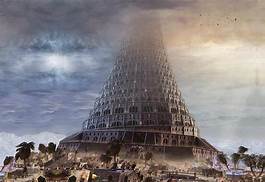
“But now the righteousness of God apart from the law is revealed, being witnessed by the Law and the Prophets, even the righteousness of God, through faith in Jesus Christ, to all and on all who believe. For there is no difference; for all have sinned and fall short of the glory of God, being justified freely by His grace through the redemption that is in Christ Jesus, whom God set forth as a propitiation by His blood, through faith, to demonstrate His righteousness, because in His forbearance God had passed over the sins that were previously committed, to demonstrate at the present time His righteousness, that He might be just and the justifier of the one who has faith in Jesus.” (Romans 3:21-26)
You and I are greatly loved by Jesus Christ. He wants to give you new life and wholeness no matter how "religious" you were, or are. |

Jesus Christ will Soon Change Everything
History will soon be radically interrupted by Phase One of the second advent of Jesus Christ.
God in Christ will then subsequently remove all evil from society, everywhere.
“The Son of Man will send out His angels, and they will gather out of His kingdom all things that offend, and those who practice lawlessness, and will cast them into the furnace of fire.
There will be wailing and gnashing of teeth. Then the righteous will shine forth as the sun in the kingdom of their Father. He who has ears to hear, let him hear!” (Matthew 13:41-43)
“But the day of the Lord will come as a thief in the night, in which the heavens will pass away with a great noise, and the elements will melt with fervent heat;
both the earth and the works that are in it will be burned up. Therefore, since all these things will be dissolved, what manner of persons ought you to be in holy conduct and godliness,
looking for and hastening the coming of the day of God, because of which the heavens will be dissolved, being on fire, and the elements will melt with fervent heat?
Nevertheless we, according to His promise, look for new heavens and a new earth in which righteousness dwells.”
(2 Peter 3:10-13)
“We are bound to thank God always for you, brethren, as it is fitting, because your faith grows exceedingly,
and the love of every one of you all abounds toward each other, so that we ourselves boast of you among the churches of God
for your patience and faith in all your persecutions and tribulations
that you endure, which is manifest evidence of the righteous judgment of God, that you may be counted worthy of the kingdom of God,
for which you also suffer; since it is a righteous thing with God to repay with tribulation those who trouble you, and to give you who are troubled rest with us
when the Lord Jesus is revealed from heaven with His mighty angels, in flaming fire taking vengeance on those who do not know God,
and on those who do not obey the gospel of our Lord Jesus Christ.
These shall be punished with everlasting destruction from the presence of the Lord and from the glory of His power, when He comes, in that Day,
to be glorified in His saints and to be admired among all those who believe, because our testimony among you was believed.” |
(2 Thessalonians 1:3-10)
The Time Blocks of History, (Dispensations)
Creation 5792 BC
The Flood of Noah 3536 BC
Abraham and the Patriarchs 2304 BC
The Exile in Egypt 2014 BC-1504
The First Advent of Messiah 3 BC
The Calling out of the Church
The Seventieth Week of Daniel
The Millennial Kingdom
The New Heavens and New Earth
Old Testament Chronology: Barry Setterfield

Extra Credit
The End of Fiat Currency (Britt Gillette)
A Radical Rapture
Babylon Working Papers
Semiramis, Queen of Babylon
Intervention from a Higher Power
Nations on The World Stage
The Conversion of Nebuchadnezzar
The Antichrist: Coming Leader of the World
Rebuild Babylon?
Belshazzar's Last Meal
The Assyrian
The Gog/Magog Invasion
A Joint in Time and History
When a Nation Dies
False Religion
Old Testament Chronology (Barry Setterfield)
A Chronology of the Times of the Gentiles
Times are 'aChanging
The Two Babylons by Alexander Hislop
Nimrod, Mars and The Marduk Connection
Wheat and Tares


Lambert's Main Library
Email Lambert Dolphin|
Archive for Newsletters
Library Annex (Articles since 2018)
August 2, 2021, February 28, 2022. September 18, 2022. December 8, 2022.
Comments, suggestions, critiques are welcome.






 The Hebrew word gibbor, meaning “strong, mighty,” describes heroes like Nimrod, “a mighty warrior … a mighty hunter before the LORD” (Genesis 10:8-9), and later applied to the “mighty warriors” of King David of Israel (2 Samuel 23:8). It's a word depicting bravery, courage, and action.
The Hebrew word gibbor, meaning “strong, mighty,” describes heroes like Nimrod, “a mighty warrior … a mighty hunter before the LORD” (Genesis 10:8-9), and later applied to the “mighty warriors” of King David of Israel (2 Samuel 23:8). It's a word depicting bravery, courage, and action. With the false prophet charismatically drawing all religiously inclined persons to the Third Temple in Jerusalem (as the gateway to heaven), the Antichrist will establish political power over all nations--succeeding where both the League of Nations and the UN failed--he will deal with money, banking, commerce and trade. Though there is a ten nation global community emerging out of the revived Roman Empire, the prevailing values will be Western.
With the false prophet charismatically drawing all religiously inclined persons to the Third Temple in Jerusalem (as the gateway to heaven), the Antichrist will establish political power over all nations--succeeding where both the League of Nations and the UN failed--he will deal with money, banking, commerce and trade. Though there is a ten nation global community emerging out of the revived Roman Empire, the prevailing values will be Western. 


 Whether in the Old Testament of the New, Jesus the Messiah is the True Shepherd of the sheep, and the rightful King of Israel, and all the nations.
Whether in the Old Testament of the New, Jesus the Messiah is the True Shepherd of the sheep, and the rightful King of Israel, and all the nations. Haggai, Zechariah and Malachi were God's prophets in Israel after the Jews returned from Babylon. As Isaiah had predicted two hundred years earlier, God would use the Persians, who conquered Babylon in 539 BC, to permit the Jews to return to Jerusalem from Babylon. The Jews did indeed rebuild their [Second] temple, dedicating it in 515 BC (with encouragement from Haggai), They served under Zerubbabel, a legitimate king in the line of David, and a legitimate High Priest, Joshua. In 445 BC Nehemiah came to rebuild the walls of Jerusalem. God's next major move in Israel's history would come nearly 500 years later when Israel's long awaited Messiah would make his appearance among His own people. Matthew, Mark, Luke and John all announced Messiah's arrival and His work.
Haggai, Zechariah and Malachi were God's prophets in Israel after the Jews returned from Babylon. As Isaiah had predicted two hundred years earlier, God would use the Persians, who conquered Babylon in 539 BC, to permit the Jews to return to Jerusalem from Babylon. The Jews did indeed rebuild their [Second] temple, dedicating it in 515 BC (with encouragement from Haggai), They served under Zerubbabel, a legitimate king in the line of David, and a legitimate High Priest, Joshua. In 445 BC Nehemiah came to rebuild the walls of Jerusalem. God's next major move in Israel's history would come nearly 500 years later when Israel's long awaited Messiah would make his appearance among His own people. Matthew, Mark, Luke and John all announced Messiah's arrival and His work.  Ray Stedman comments as follows on this passage: "This beast arises from the earth, used throughout the book as a symbol of Israel. That is why most biblical scholars say this man is probably a Jew. He comes from Israel and has "two horns like a lamb, but he talks like a dragon." He looks like a lamb, but he talks like a dragon. He is, therefore, a fake lamb, to put it bluntly. This is the Antichrist, the one who comes instead of Christ, who offers himself as though he were Christ. It is for this reason I believe the term Antichrist is properly applied to this second beast, although both beasts are anti-Christian in character. Horns speak of power, and this man has two lamb-like powers. Jesus also had these powers: the powers of a priest and of a prophet. This man acts as both. Jesus is a priest who leads men and women all over the world to worship the Father; and this individual is a priest, leading the world to worship the first beast.
Ray Stedman comments as follows on this passage: "This beast arises from the earth, used throughout the book as a symbol of Israel. That is why most biblical scholars say this man is probably a Jew. He comes from Israel and has "two horns like a lamb, but he talks like a dragon." He looks like a lamb, but he talks like a dragon. He is, therefore, a fake lamb, to put it bluntly. This is the Antichrist, the one who comes instead of Christ, who offers himself as though he were Christ. It is for this reason I believe the term Antichrist is properly applied to this second beast, although both beasts are anti-Christian in character. Horns speak of power, and this man has two lamb-like powers. Jesus also had these powers: the powers of a priest and of a prophet. This man acts as both. Jesus is a priest who leads men and women all over the world to worship the Father; and this individual is a priest, leading the world to worship the first beast.


 Revelation Chapter 17 evidently refers to the sudden replacement of all world religions by enforced worship of one man: the Antichrist, described in Chapter 13. (“Anti” here appears to mean “instead of” rather that “against” though he is opposed to the real Jesus.) Once he has consolidated power over earth’s nearly 200 nations he will radically revise the world commercial and banking system. This is the subject of Revelation 18. Many have thought His HQ would be Rome but rebuilt Babylon in Iraq now seems more likely. This evil tyrant is thought by some to be a new Nimrod. None of these events can happen until the true church has departed at the Rapture (1 Thessalonians 4). Note that all religion world wide has to be replace by worship of the beast, the Antichrist.
Revelation Chapter 17 evidently refers to the sudden replacement of all world religions by enforced worship of one man: the Antichrist, described in Chapter 13. (“Anti” here appears to mean “instead of” rather that “against” though he is opposed to the real Jesus.) Once he has consolidated power over earth’s nearly 200 nations he will radically revise the world commercial and banking system. This is the subject of Revelation 18. Many have thought His HQ would be Rome but rebuilt Babylon in Iraq now seems more likely. This evil tyrant is thought by some to be a new Nimrod. None of these events can happen until the true church has departed at the Rapture (1 Thessalonians 4). Note that all religion world wide has to be replace by worship of the beast, the Antichrist. 





 The account zooms in on an individual named Nimrod, who is called a great hunter. He is a rather mysterious figure, of great importance in ancient history. He is the founder, as we are told, of both Babylon and Nineveh, the two great cities of antiquity which ultimately became enemies of Israel. The prominent thing said about him here is that he was a mighty man, "a mighty hunter before the LORD." Now it was the work of kings in those ancient days to be hunters. This was a time when civilization was sparse and wild animals were a constant threat to the peoples. Kings, having nothing much else to do, organized hunting parties and acted as the protectors of their people by killing wild animals. Nimrod evidently gained a great reputation as such a hunter, but he was more than a hunter of wild animals. The Jewish Talmud helps us here, for it says that he was "a hunter of the souls of men."
The account zooms in on an individual named Nimrod, who is called a great hunter. He is a rather mysterious figure, of great importance in ancient history. He is the founder, as we are told, of both Babylon and Nineveh, the two great cities of antiquity which ultimately became enemies of Israel. The prominent thing said about him here is that he was a mighty man, "a mighty hunter before the LORD." Now it was the work of kings in those ancient days to be hunters. This was a time when civilization was sparse and wild animals were a constant threat to the peoples. Kings, having nothing much else to do, organized hunting parties and acted as the protectors of their people by killing wild animals. Nimrod evidently gained a great reputation as such a hunter, but he was more than a hunter of wild animals. The Jewish Talmud helps us here, for it says that he was "a hunter of the souls of men." 






